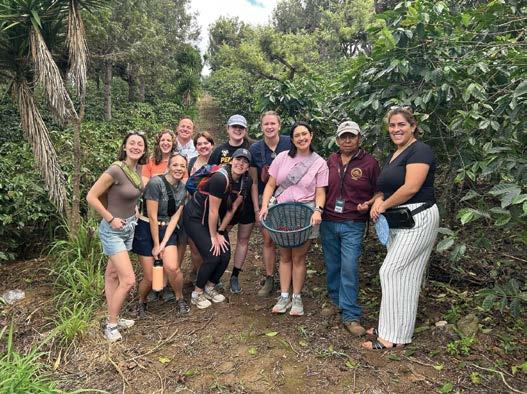GONZAGA LAW 2025

Pathways to Understanding
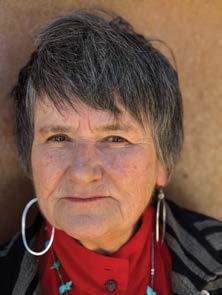



Sheila Miles is Gonzaga Law School’s artist-in-residence, displaying artwork throughout the law school building from fall 2024 to spring 2025.
“I am interested in the abstract qualities of shape and form, textures and patterns, and use a complex color palette and range of values for the viewer to enter the space,” explains Miles. “With more than 50 years as a dedicated painter, I am still looking for complex and hidden compositions and new ways to describe the world.”
Miles received her B.A. and M.A. in painting and drawing from Purdue University. After five years in Provincetown, Massachusetts, and a brief time in New York City, she later moved to Montana, where she established a vibrant career for more than 26 years. In addition, Miles lived in Santa Fe, New Mexico, for 14 years before moving to Oracle, Arizona, in 2020.
Her art has been displayed in more than 300 exhibitions, and 200 of her works are included in public collections such as New Mexico’s Art in Public Places, the Federal Reserve Bank of Minneapolis, the Montana Museum of Art and Culture, the Provincetown Art Association and Museum, the Yellowstone Art Museum, and the Missoula Art Museum.
Widely exhibited and collected throughout the West, she is represented by The Art Spirit Gallery in Coeur d’Alene, Idaho, and Hat Ranch Gallery in Santa Fe.
In addition to her prolific career as an artist, she is an art consultant and workshop instructor.
Gonzaga University School of Law is grateful for this partnership with The Art Spirit Gallery for bringing incredible artists like Sheila Miles to our hallways and magazine pages. Throughout this issue, you will experience Miles’s outstanding work. To learn more about her, visit artistmiles.com.
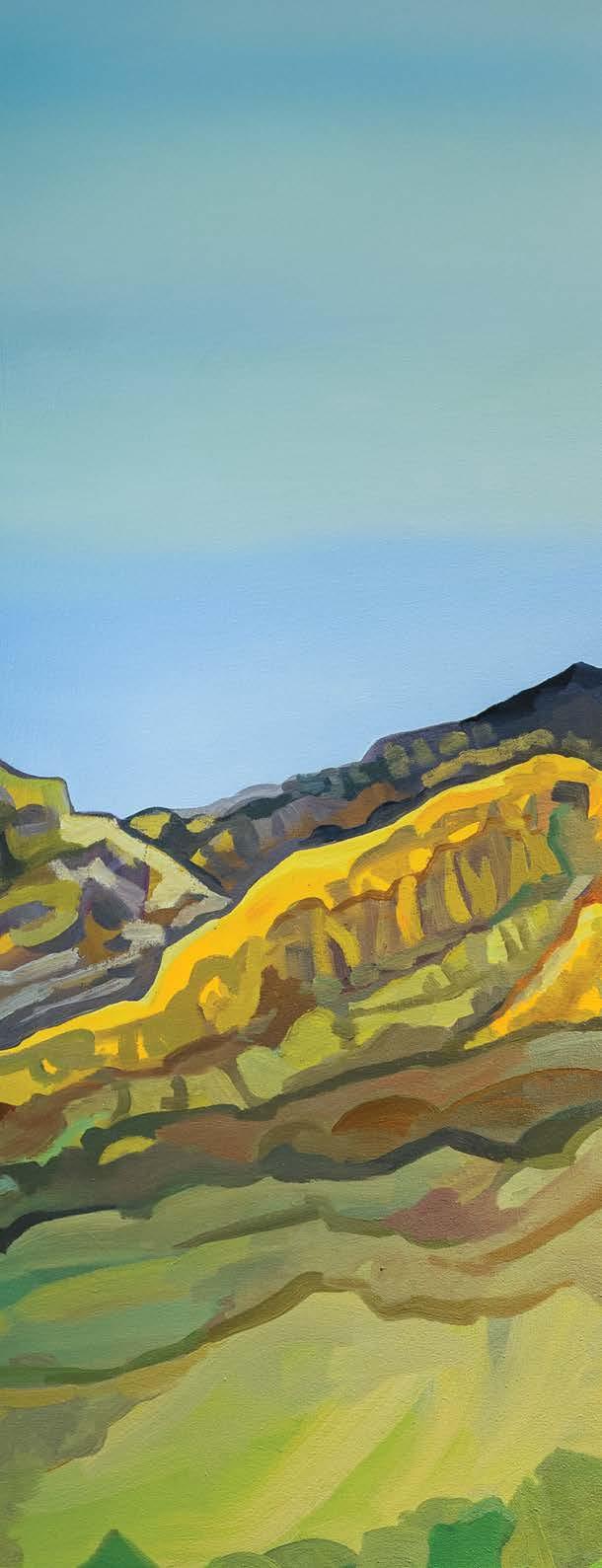

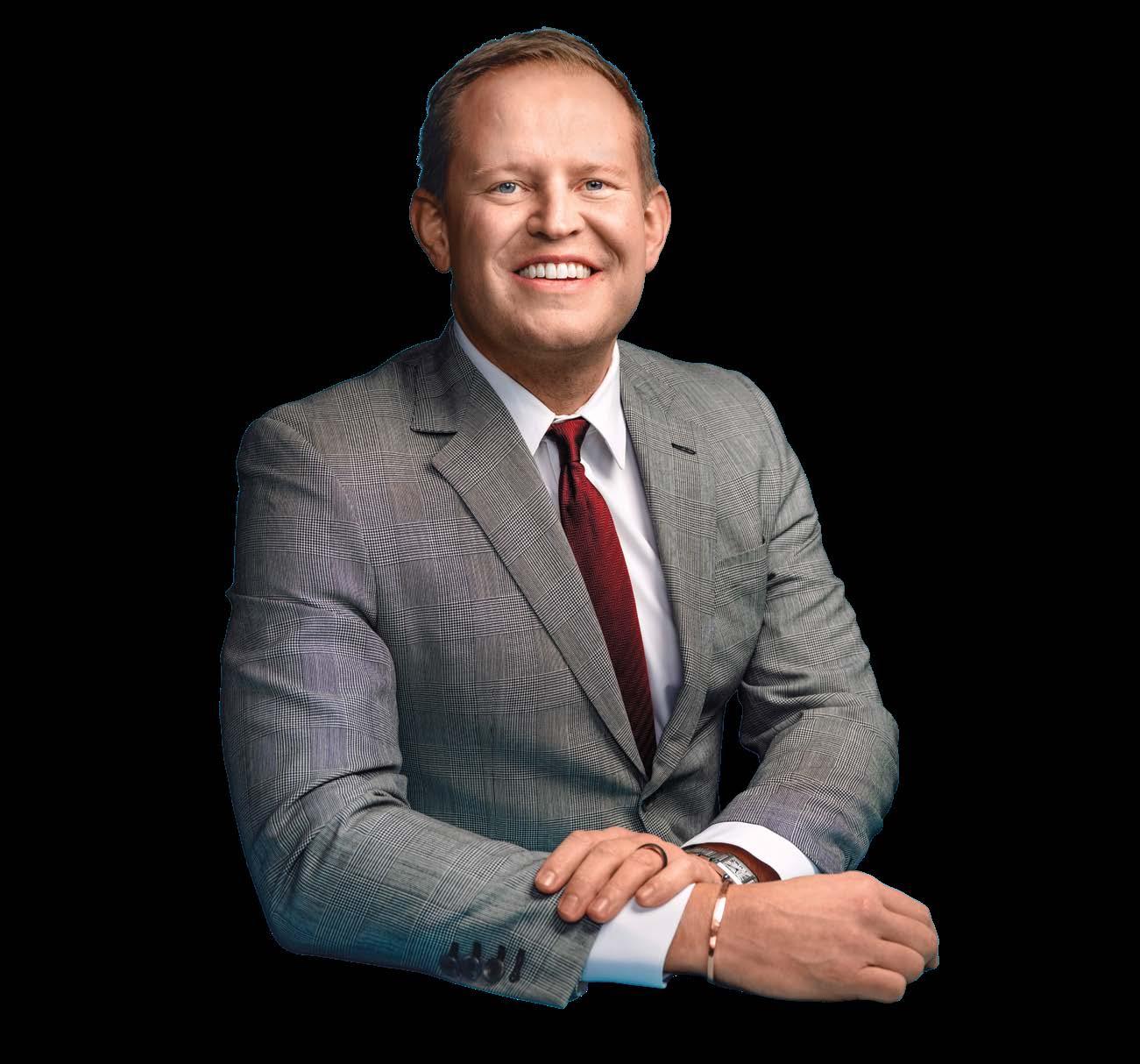
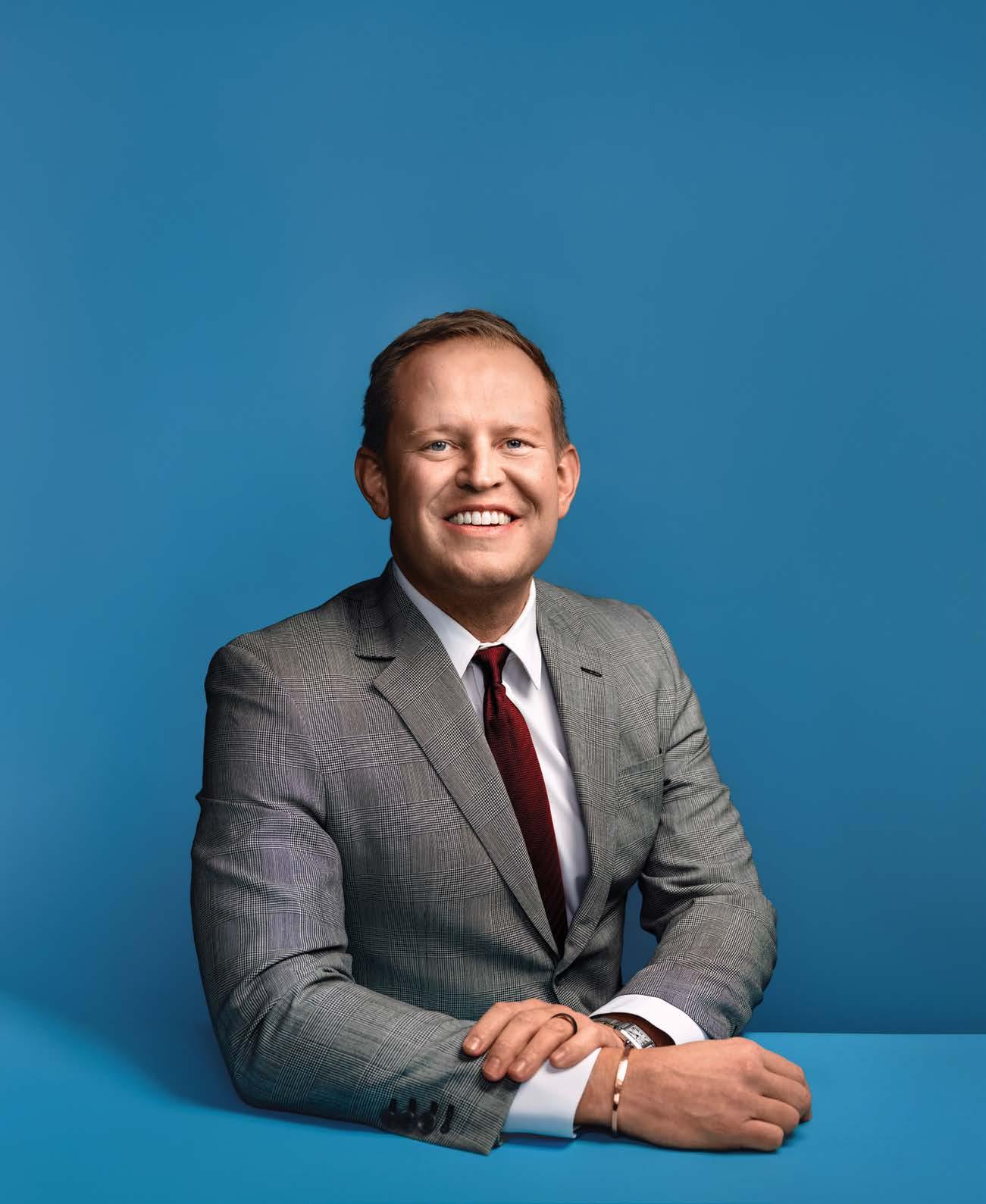
The rule of law has always been more than a set of legal principles and procedures. It is a framework for understanding – of rights and responsibilities, of competing values, and of how we resolve disputes and coexist in a complex society. More than ever, we need the law to serve as a bridge rather than a battleground, a means of connection rather than division.
We live in a time of deep polarization. Political debates feel intractable, social divisions widen, and the ability to engage in reasoned, meaningful discussion too often gives way to soundbites and certainty. Yet the law, at its best, does not function in absolutes. It thrives in nuance. It compels us to weigh perspectives, interpret meaning, and seek resolution not through force or volume, but through reason, precedent, and principle. It requires us to listen.
Legal education, likewise, is more than the training of practitioners. It is the cultivation of critical thinking, disciplined argumentation, and – most importantly – understanding. Lawyers do not simply advocate. They explain. They translate between competing interests, articulate positions with clarity, and bring order to what otherwise would be chaos. In an era when many speak past one another, lawyers are trained to hear both sides.
The ability to understand before judging is foundational to justice. It is also increasingly rare. The law remains one of the few institutions where rigorous debate and thoughtful disagreement are expected and even encouraged. Courts do not function without opposing arguments, nor can legal decisions be made in a vacuum. This process – built on the idea that truth emerges from a full and fair hearing – is precisely what our public discourse lacks.
At Gonzaga Law School, we take seriously the duty to uphold rigorous debate, foster thoughtful disagreement, and cultivate a culture where reason and justice prevail. Our students engage with the hardest legal and ethical questions of our time. They study not only what the law is, but why it developed the way it did, and where it might go next. They learn to separate rhetoric from reason, assumption from evidence. And as they enter the profession, they carry forward the vital vision of law as a pathway to understanding – a means of making sense of the world, resolving disputes, and, ultimately, fostering a society that is more just and less divided.
As you read the articles in this issue, you will encounter different perspectives on how law serves as a gateway to deeper comprehension – whether through policy, advocacy, jurisprudence, or lived experience. These stories remind us that while law is often seen as a tool of power, it is equally a tool of clarity, a discipline that calls us to engage with complexity rather than retreat from it.
In this time of division, the legal profession has a choice: to mirror the fractiousness of the world around us or to stand apart from it, upholding our role as stewards of understanding. The path is clear. The law leads us forward. And Gonzaga Law School embraces the charge of making law a beacon for understanding.

Smithmoore P. Myers Dean, School of Law Professor of Law & Leadership Studies
President Katia Passerini
Smithmoore P. Myers Dean, School of Law
Jacob H. Rooksby
Project Manager
Thea Skokan
Marketing & Brand Manager
Jordyn Linnell
Editor Crystal Atamian
Designer Henry Ortega
Senior Writer
Cheston Knapp
Contributing Writers
Dallan Flake
Sarah Guzmán
Hannah Matchell
Agnieszka McPeak
Photographer Zack Berlat
Contributor Joshua Garcia
Gonzaga Law Magazine is published annually for alumni, faculty, staff, and friends of Gonzaga University School of Law to stay connected to one another and the mission of Gonzaga University. The opinions expressed do not always represent the view of the administration but are intended to foster open dialogue and lifelong learning in the Jesuit tradition.
If you have comments or suggestions, please email the Law School Foundation office: lawalumni@gonzaga.edu. Visit online: gonzaga.edu/law
On May 10, 2025, 199 law students graduated and received their Juris Doctor degrees.
Gonzaga Law School awarded the 2025 Law Medal to Chief Justice Debra Stephens (ʼ87 B.A., ʼ93 J.D.) whose distinguished career embodies the very best of our profession and service of justice. Chief Justice Stephens reflected on what the law is and how we participate in it. She shared that we are the story keepers of the law — how we practice law, teach law, and interpret the law. She shared a quote from Cornell West, who said we must never forget love and justice are connected, and justice is what love looks like in public.

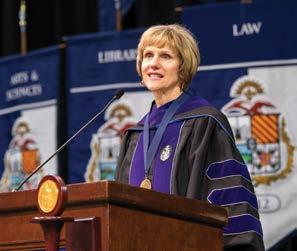
The keynote speaker was U.S. Senator Tim Kaine (D-VA). Gonzaga Law School proudly bestowed Sen. Kaine with a Doctor of Law, honoris causa. Sen. Kaine gave a thoughtful, personal address about the influence of first clients and the lasting importance of doing what is right. Sen. Kaine commended the law class of 2025 for their more than 5,500 hours of pro bono work. He also shared
Carolyn Powers received the Dean’s Academic Achievement Award for exceptional academic performance, achieving the highest cumulative grade point average during her three years at Gonzaga Law School. Powers served as a teaching assistant for Civil Procedure and Contracts and gained practical experience working at Paine Hamblen, LLP. After taking the Washington State bar exam, she looks forward to clerking for Judge Tracy A. Staab in the Washington Court of Appeals.

memories from when he was just starting out and moving into the exciting and uncertain path to practice law. He encouraged graduates to keep learning from others — attorneys, judges, and especially clients. Sen. Kaine said the first clients he worked with have been memorable throughout his career.

The class of 2025 selected Mia Nicole Irvin to be the student speaker. She shared that during law school, “There were days when I felt like I was on top of the world. And then there were days where I felt like the world was on top of me.” She recognized the crucial support of loved ones — family, friends, and mentors — whose encouragement made this achievement possible. Irvin praised her classmates’ achievements and
envisions them as future leaders within their communities.
Dean Jacob H. Rooksby shared that graduation from law school is not an end, but a beginning to a demanding and meaningful journey. He encouraged graduates to face future challenges with courage, persistence, and heart. He reminded them the legal profession needs people who are thoughtful, brave, and committed to justice.
Each year, Gonzaga Law Students can participate in the Sweetser Closing Argument Competition. This competition, designed by Jim Sweetser (’84 J.D.) and his son Marcus, gives students a simulation of a civil rights case in which they argue for monetary damages.
After receiving the case study, students present a 15-minute closing argument with only one hour to prepare. In addition to testing their oral advocacy skills and receiving feedback from attorneys, students have the opportunity to win cash prizes.
This year’s Sweetser Closing Argument winners:
Joko Cailles
Kaci Gamboa
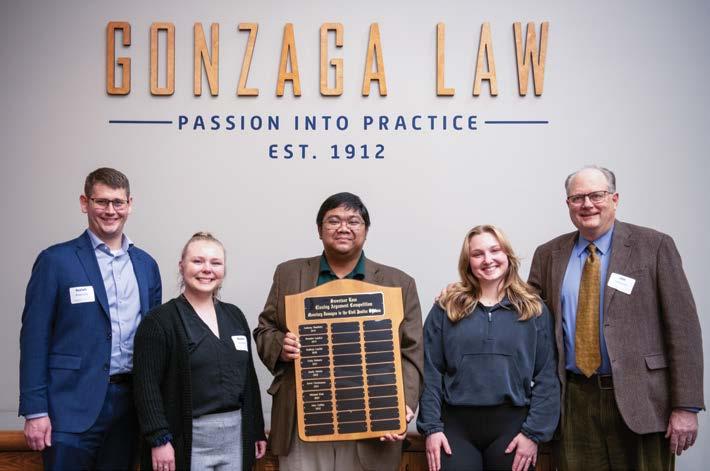
$3,000
$2,000
Quinn Leonard $1,000
The Clarke Family Prize in Legal Ethics is an annual continuing legal education event dedicated to professional responsibility. This program originates from the Harvey and Harriet Clarke Fund for Professionalism and Ethics, established in 1980 to support Gonzaga Law’s commitment to legal ethics for both students and practicing attorneys.
This year, the Prize focused on the topic of professional responsibility. Gonzaga Law welcomed alumni, community members, and students to learn about truth, technology, and legal ethics.
Jaren
Jaren
Gonzaga Law hosted Rebecca Delfino, professor of law at Loyola Law School Los Angeles, and Daniel W. Linna Jr., director of law and technology initiatives at Northwestern Pritzker School of Law. The pair shared information on AI and legal ethics, how to use AI responsibly and well, and candor considerations for attorneys and judges using AI.
Students participated in written, oral, and overall competitions. Congratulations to the students who shared $10,500 in prize money.
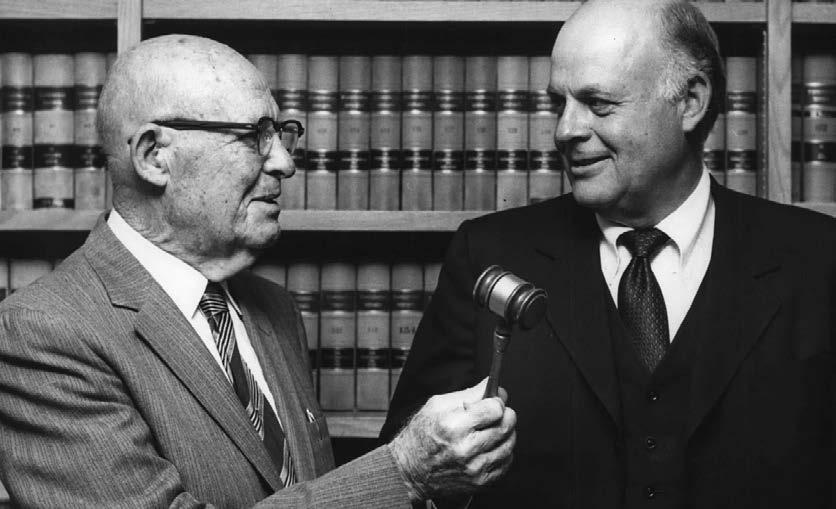
The Quackenbush Lecture Series at Gonzaga University School of Law is a living tribute to the enduring legacy of the Honorable Justin L. Quackenbush (ʼ57 J.D.), a distinguished jurist, devoted public servant, and steadfast advocate for justice and education.
Judge Quackenbush’s remarkable life of service began in Spokane, where he was born in 1929. After serving in the U.S. Navy, he earned his law degree from Gonzaga School of Law and established a respected career as a trial attorney. In 1980, President Jimmy Carter appointed him to the U.S. District Court for the Eastern District of Washington, where he served with distinction — including as chief judge — and continued to hear cases as a senior judge well into his later years. Known for his fairness, intellectual rigor, and deep respect for the rule of law, Judge Quackenbush was a model of judicial excellence, mentorship, and civic dedication.
Judge Quackenbush believed deeply in the power of education to advance justice. Karl and Marie Quakenbush established an endowment and founded the Justin L. Quackenbush Lecture Series, which brings distinguished speakers to campus to engage students, faculty, and the broader community in vital legal and ethical conversations.
Thanks to the generous support of the Quackenbushes, and their deep commitment to advancing legal education and honoring the legacy of Judge Justin L. Quackenbush, Gonzaga Law School proudly welcomed the 2025 Quackenbush Lecture Series speaker, Judge Raul Pangalangan. A former judge at the International Criminal Court at The Hague from 2015 to 2021, Judge Pangalangan shared his insights on international criminal justice, reflecting on complex cases
Justin L. Quackenbush, (right), and his father, Carl C. Quackenbush, in 1980 (Courtesy of Spokesman-Review photo archives)
involving war crimes, child soldiers, forced marriages, and attacks on cultural heritage.
Gonzaga Law School is proud to carry forward the Justin L. Quackenbush Lecture Series, celebrating the legacy of a man whose life’s work continues to educate and inspire future generations in the legal field.
Give today to support the Judge Justin Quackenbush Endowment by scanning the QR code or visiting gonzaga.edu/lawgive/Quackenbush


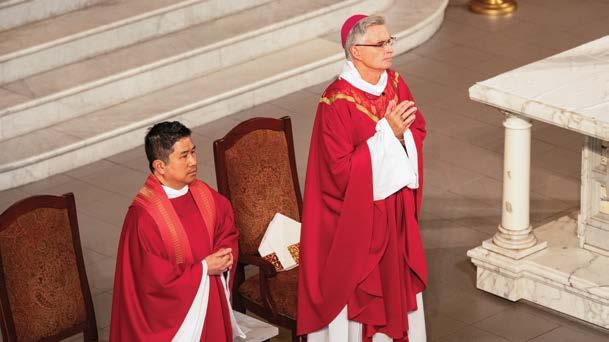

In January 2021, Gonzaga University School of Law established the Carl Maxey Social Justice Scholarship Program in honor of Gonzaga Law graduate and distinguished attorney Carl Maxey. This year’s Carl Maxey Scholars were Dulcemaria Baez, Thalya Cruz, and Alexander Octavius (not pictured).
Members of the Spokane legal community gather annually for Red Mass at St. Aloysius Church at Gonzaga University to pray for God’s blessing or set an intention for guidance for themselves and the legal profession. Red Mass is a tradition dating back to 1310, marking the beginning of the Michaelmas (fall term) of the Kings’s Bench during the reign of Edward II of England. It was an honor to have members of the legal community and Jesuits present at Red Mass, including Father Bryan Pham, S.J., law chaplain and assistant professor at Gonzaga.
Gonzaga Law School Smithmoore P. Myers Dean Jacob H. Rooksby recognized Janice P. Brown (ʼ83 J.D.) with the Distinguished Legal Service award. Brown is a pioneer in the legal profession as the chair of Meyers Nave’s statewide Labor and Employment Practice and Workplace Investigations Practice groups. She is a trusted adviser to clients, an inspirational mentor to colleagues, and an influential leader in advancing diversity throughout the legal profession.
Brown has been actively engaged with Gonzaga Law School, serving on the Law School Board of Advisors and speaking with law students about various topics, including women in leadership, managing a law firm, and mentorship for law students.

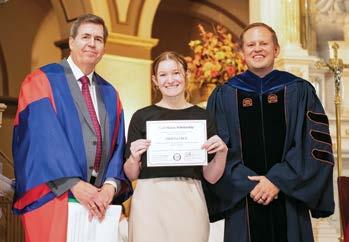
Gonzaga Law School’s Clinical Legal Programs have expanded, offering students more opportunities for real-world experience. In fall 2025, students can choose from one of 10 clinics, including three new ones. Among these are the Trademark Clinic and Patent Clinic, both part of the expanded Intellectual Property Law Clinic, as well as the highly anticipated Sports Law Clinic.
For the first time, Gonzaga Law students had the opportunity to participate in the Trademark Clinic and Patent Clinic, led by industry professional and supervising attorney Britten Sessions. Sessions, also serving as the executive-in-residence at the Gonzaga Law School’s Center for Law, Ethics & Commerce, has played a key role in coaching the Patent Trial and Appeal Board Moot Court Competition and the U.S. Patent and Trademark Office Patent Drafting Competition. Under his leadership, the clinics served 49 clients and were successfully accepted into the USPTO Clinic Program for both trademark and patent matters. Additionally, the clinics filed 14 client matters with the USPTO, resulting in the issuance of two trademark rights, thanks to the work of the students and Professor Sessions.
Students who have participated in the PTAB Moot Court Competition, USPTO Patent Drafting Competition, and the IP Clinics consistently express their gratitude for the opportunity. One student noted the clinic was “the most
fun you could have in law school.” Kora King, a 2L, reflects on her experience: “The clinic provided me with hands-on opportunities to work with real clients, assist in drafting patent applications, and navigate the intricate processes of patent law. Under the guidance of experienced professionals like Professor Sessions, I gained practical skills and deepened my understanding of intellectual property law in a way that no textbook could offer.”
Looking ahead, the IP Law Clinics are expanding to run year-round, offering students the chance to gain additional experience during the summer months. The future vision for the clinics remains rooted in student development. “The primary reason for these clinics is to provide the best experience possible in training our students,” Sessions explains. “While there’s an obvious benefit to the community, our focus is on giving students the tools and experience they need to succeed. We’ve also integrated AI tools into the clinic’s offerings over the past year to help students stay up-to-date.”

Britten Sessions, supervising attorney of the Intellectual Property Clinic
Give today to support the IP Clinic by scanning the QR code or visiting gonzaga.edu/lawgive/IP

The establishment of a Sports Law Clinic at Gonzaga University feels like a natural fit, especially given the recent surge in legal issues surrounding college athletics. With the evolution of name, image, and likeness laws, many are left to navigate the complexities of sports law with limited resources. The new clinic seeks to fill this gap, offering valuable guidance to athletes. “Our primary goal is educational outreach, ensuring that more athletes – across a diverse range of sports – have access to clear, practical guidance on their rights and obligations,” says Chris Mercado, the clinic’s supervising attorney.
In fall 2025, three students joined Professor Mercado to help shape the clinic’s foundation, focusing on creating resources, outreach, and
Henry Gould, Shelby Stevens, Professor Mercado, and Carson Thiel (left to right)
marketing. The students taught Name, Image, and Likeness classes, provided “Know Your Rights” presentations to Gonzaga athletes, and attended community events, including workshops for student organizations. They also networked with Gonzaga Athletics, general counsels, coaches, and athletes. In addition, the team worked on local NIL partnerships with sponsors.
For 3L student Shelby Stevens, the clinic offered the opportunity to pursue her long-standing interest in sports law. “The Sports Law Clinic significantly expanded my understanding of the evolving NCAA landscape, equipping me with the tools to navigate complex regulations and developments,” Stevens says. “Through hands-on experience,
I gained the ability to analyze and interpret legal agreements and break down intricate concepts into clear, digestible explanations – skills I will carry into my career.”
Professor Mercado sees the clinic continuing to grow, offering students valuable experience while making a positive impact on the future of college athletics. “We will shape the next generation of sports lawyers while ensuring college athletes receive the guidance and protections they deserve,” Mercado says. “We will continue to build a clinic that will make a lasting impact on the future of college athletics.”
Kora King, Jessica Kerlee, Kathryn Simpson, Emil Albright, and Professor Sessions (left to right)


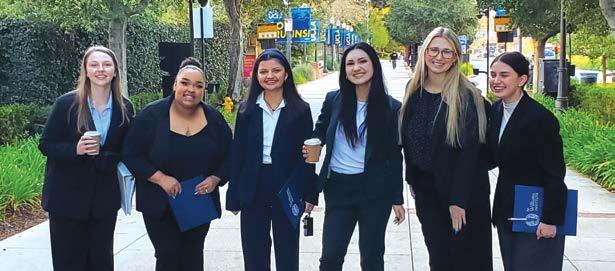
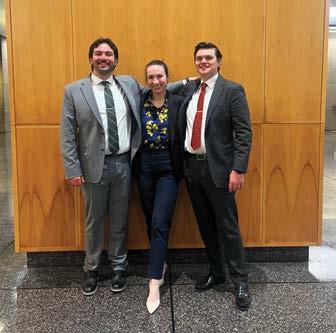
The National Appellate Advocacy Competition teams brought skill, poise, and fierce advocacy to the American Bar Association’s prestigious Regional Qualifiers in Philadelphia. Facing off against 32 top-tier teams from across the country, Gonzaga made a powerful impression, with both teams making it to the Sweet Sixteen.
The National Trial Team defended its first-place title in the second annual “Best in Washington’’ Voir Dire Competition. Team 1, featuring Alex Ambartsumian, Connor Martin, and Randle Kinswa, took first place. Team 2, featuring Patrick Johnson, Gaelen McPartland, and Allison Salvador, also excelled, with McPartland earning the Outstanding Advocate Award.
The 2024-25 Civil Rights & Liberties Moot Court team made team history by competing in the premier national moot court competition at The Williams Institute at UCLA School of Law. This competition is dedicated exclusively to sexual orientation and gender identity law. Gonzaga School of Law sent two teams of three students: (3L team) Elle Maberry, Karlie Murphy, and Ava Sharifi; and (2L team) Jacquelyn Gaither, Preju Koirala, and Sydney Wilburn. Despite receiving excellent feedback from their panels of judges – and even their competition – neither team moved on to the quarter finals.

Gonzaga Law’s National Trial Team had a record-breaking competition season. Two competing teams traveled to Portland, Oregon, and went up against law schools from Washington, Oregon, Idaho, Montana, Wyoming, Utah, and Colorado. Both teams swept their first round, winning five out of six ballots, a first for Gonzaga. Team 1, featuring Alec Ferris, Vic Chin, and Allison Salvador, displayed amazing teamwork and advocacy skills.
Team 2, featuring Rhys Colson, Anna Pearson, Sam Tumblin, and Randle Kinswa, entered the semifinals as the third-overall team — the highest rank in Gonzaga’s history! The coach, Judge Jeremy Schmidt, and assistant coach, Deputy Prosecutor Ryne Shaw, extend their gratitude to former trial team members, law students, and members of the Spokane legal community who volunteered their time, insights, and expertise in preparation for this competition.
SAUL LEFKOWITZ COMPETITION
Gonzaga Law School fielded two teams at the Northwest Regional of the Saul Lefkowitz Moot Court Competition in California. Cayden Hennessey, Christian Misseldine, Jesslin Ochoa, and Kimberly Villacorta represented the school in San Francisco. Lexi Howard-Mullins, Karla Lozano-Smith, Jaren Perry, and Evan Surrency earned second place and Best Brief, advancing to the national finals in Washington, D.C. where they were named national champions and awarded Best Brief. This marks Gonzaga Law School’s first national title in the Saul Lefkowitz competition history.

Jaren Perry, Karla Lozano-Smith, Evan Surrency, Lexi Howard-Mullins, Kimberly Villacorta, Cayden Hennessey, Jesslin Ochoa, and Christian Misseldine (left to right)
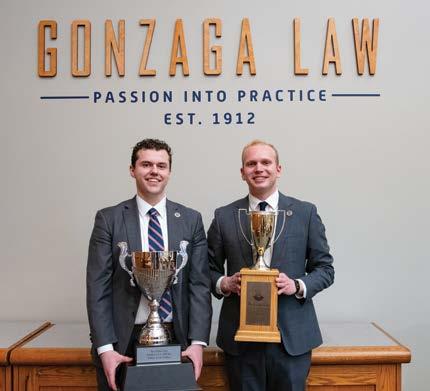
LINDEN CUP COMPETITION
In March 2025, 38 teams contended for the prestigious Linden Cup. The esteemed panel of judges included justices from the Supreme Courts of Idaho, Washington, and Minnesota, along with the Colville Tribal Court of Appeals and the Coeur d’Alene Tribe. The justices and judges imparted outstanding guidance and insight to the competitors. Jaren Perry and Koby Brown were named champions of this year’s Linden Cup. The Moot Court Honors Council expressed their deepest thanks to all the local attorneys, judges, and Supreme Court justices for continuing to support this competition and Gonzaga Law School students.
NATIONAL APPELLATE ADVOCACY COMPETITION
- Kaci Graber
- Nick Tovar
- Chris Swienty
- Danielle Giffin
- Frank Sefton
- Nick Vikari
NATIONAL TRIAL TEAM
- Connor Martin
- Allison Salvador
- Alex Ambartsumian
- Rhys Colson
- Gaelen McPartland
- Patrick Johnson II
- Vic Chin
- Sam Tumblin
- Anna Pearson
- Alec Ferris
- Randle Kinswa
CIVIL RIGHTS & LIBERTIES
- Elle Maberry
- Sydney Wilburn
- Jacquelyn Gaither
- Ava Sharifi
- Preju Koirala
- Karlie Murphy
SAUL LEFKOWITZ
- Lexi Howard-Mullins
- Evan Surrency
- Karla Lozano-Smith
- Jaren Perry
- Jesslin Ochoa
- Christian Misseldine
- Kimberly Villacorta
- Cayden Hennessey
SPORTS LAW COMPETITION
- Shelby Stevens
- Alex Beckley
- Nina Emerick
LINDEN CUP COMPETITION WINNERS
- Jaren Perry & Koby Brown
MOOT COURT HONORS COUNCIL
- Anna Pearson, President
- Danielle Groth, Vice President
- Kimberly Villacorta, Secretary
- Brian Karsann, Treasurer
- Nick Vikari, Linden Cup Coordinator
- Danielle Giffin, President-Elect
Volunteer to be a Moot Court Judge gonzaga.edu/lawjudge

U.S. Senator Tim Kaine is a former civil rights lawyer and Virginia governor. Washington State Supreme Court Chief Justice Debra L. Stephens (’87, ’93 J.D.) is a longtime advocate for access to justice and the first woman from Eastern Washington to serve on the state Supreme Court. Both sat down with Smithmoore P. Myers Dean Jacob
H.
Rooksby to share their insights
on what it means to serve
the law with purpose.
JACOB H. ROOKSBY (JR): WHAT ROLE DO YOU BELIEVE LAWYERS PLAY IN PRESERVING THE RULE OF LAW IN A HEALTHY DEMOCRACY?
Chief Justice Debra L. Stephens (DS): I’ve always believed the judicial branch is the backbone of our democracy because courts are the one place where everyone has a voice, regardless of social position or the popularity of their viewpoint. Some say courts are the least democratic branch, but that’s true only in the sense that decisions are made based not on popular opinion but on fundamental constitutional values and the rule of law. I think it’s more accurate to say that ours is the most democratic branch of government because a democracy survives only when we respect the value of every individual. We need courts to serve as an essential check on the tyranny of majorities or those who disregard the limits of their political power.
U.S. Senator Tim Kaine (TK): No matter the client or practice area, every lawyer is a contributor to and practitioner of the rule of law. The notion that everyone must follow the law can only survive if people trust that outcomes are arrived at fairly. That means processes of law need to be carried out ethically and capably by all practitioners involved. I hope all lawyers, regardless of where they are in their careers, remember the sacredness of the rule of law.
JR: HOW HAS YOUR VIEW OF THE LEGAL PROFESSION EVOLVED OVER THE COURSE OF YOUR CAREER?
TK: My view of the profession has evolved as my own responsibilities have changed. As I transitioned from practicing lawyer to elected official, I began to see how certain aspects of the profession can be wonderful training for public service in politics. Great lawyers must learn how to depersonalize conflict. Whether you’re trying a case or negotiating a real estate deal, you can run into conflict between litigants, clients, lawyers – sometimes even judges. The best lawyers know how to zealously represent their clients while also reducing unnecessary personal enmity connected with the matter at hand. Eighteen years of doing this in law practice has been enormously helpful in my public life. The senator who votes against a Kaine initiative today can still be an ally on a vote tomorrow, so long as I don’t make today’s disagreement personal. But if I let anger boil over and continue, it makes future cooperation much harder.
DS: I came out of law school thinking of the legal profession as sort of a learned “trade,” in that a legal education prepares one to do the specialized work involved in solving legal problems. I now see that applying legal knowledge is only part of the lawyer’s role. More fundamentally, we are public servants and

guardians of the rule of law, and as a profession we have a responsibility to expand the experience of justice for more people. If justice is available only to a handful of paying clients, it isn’t justice. We must look beyond our own practice areas and consider the greater good.
JR: IN A TIME OF RISING PUBLIC DISTRUST IN INSTITUTIONS, HOW CAN LAWYERS HELP REBUILD CONFIDENCE IN THE LEGAL SYSTEM?
DS: Lawyers are the best ambassadors of our justice system. They can use their legal training to help demystify the legal process and show how legal rules are, at heart, an expression of the values that serve to guide our social interactions and offer solutions to complex problems. We shouldn’t pretend legal institutions are perfect, but lawyers have a unique opportunity to work within the legal system to improve it and better meet the needs of the people we serve.
TK: Ethical conduct and unethical conduct are both contagious, and every member of this profession has a role to play in rebuilding confidence in the legal system. My advice is to work hard, do your job ethically, and be effective advocates for your clients to the best of your ability.
“Lawyers have a unique opportunity to work within the legal system to improve it and better meet the needs of the people we serve.”
DEBRA L. STEPHENS
JR: WHAT ADVICE WOULD YOU OFFER TO NEW LAW GRADUATES ABOUT FINDING PURPOSE AND MEANING IN THEIR LEGAL CAREERS?
TK: Two things. First – keep an open mind and open ears. You’ll learn a lot from your peers, your mentors, your bosses, and especially your clients. One of the great things about this profession is that in every room you’re in, you’ll be around someone who’s more knowledgeable or more experienced than you are. Embrace that. You will never run out of things to learn or new perspectives to ponder – and that will make your practice better and more meaningful. You’ll be able to be that person for others too – peers, younger lawyers, or even more experienced attorneys will learn from you, and it will make them better in their own practice. To reiterate something I said when addressing the graduating class of 2025: “My clients taught me lessons I still reflect on today, long after I moved on from my law practice to enter elected office. They changed me as a lawyer, and they changed me as a person. And they will change you, too.”
Second – you are part of a profession built on centuries-old norms of ethical conduct and advocacy. Doing your job well sustains and consolidates the norms that make it unacceptable for someone else to do their job poorly or unethically. So even when you’re working on your most unglamorous or banal task, by doing it ethically and well you are making a continual and necessary contribution to the norms that make the pursuit of justice possible in the first place. From the moment you add “, esq.” to your name, you are part of something larger than yourself: a profession that, at its best, protects our rights and freedoms. Let that be a source of inspiration – everything you do as a lawyer carries meaning for preserving our system of laws.
DS: Strive for connection – building relationships with people in various walks of life and focusing on improving your local community. Sometimes as lawyers, we set our sights on lofty ideals and big visions, and we work tirelessly toward a distant goal. But life happens in the meantime, and it’s lived in small moments, with family, friends, coworkers and neighbors.
JR: CAN YOU SHARE AN EXPERIENCE FROM YOUR CAREER IN LAW OR PUBLIC SERVICE THAT REAFFIRMED YOUR FAITH IN THE LEGAL SYSTEM?
DS: There are so many! Some of the most impactful experiences involved me learning courage and resilience from my clients or litigants in my court. Years ago, I had the honor of appearing as amicus alongside a woman who was arguing her own case in the Washington Supreme Court. She had battled for her right to insurance after a devastating auto accident, in both Washington and Canadian courts. It was a complicated case involving foreign judgments and procedural rules, but she believed in the justice of her cause. I never heard a more persuasive argument than her presentation to the state supreme court, and I was so proud of the court when it issued a speedy, clear decision recognizing her claim. Justice Chambers wrote the decision, and years later, when I was on the court, I had the pleasure of sitting with her at his celebration of life. To her, the affirmation she received was worth more than any monetary recovery, and she was truly uplifted by that experience of justice.
TK: There are so many, but I’ll highlight one. A few months into my practice, one of the senior lawyers brought a newly-married husband and wife – James and Diane – into my office. The couple had just tied the knot and were so happy together. But Diane – who had a mental disability – had been previously living with a distant relative who was a legal guardian and had wed James over her guardian’s objection. The guardian sued, trying to annul the marriage on the basis that Diane didn’t have sufficient mental capacity. This was obviously not true, and I represented her in that suit. I got the suit dismissed, but in the process, we found that the guardian wasn’t in it for some deep concern for Diane – she’d been pocketing Diane’s disability payment checks for years. So, what started off as a marriage case in Richmond Juvenile and Domestic Relations Court ended up as a criminal trial against the guardian in federal court.
This for me was an energizing and inspiring case –because the legal system had stopped a malign actor from trying to sabotage the marriage of a relative in her care so she could keep essentially stealing money from her. The legal system, and the effective practice of law therein, had preserved a happy marriage and caught a thief. Not bad for a day’s work! Every lawyer in their practice will have experiences that clarify and reinforce their faith in the legal system. For me, this was a big one.
“Ethical conduct and unethical conduct are both contagious, and every member of this profession has a role to play in rebuilding confidence in the legal system.”
TIM KAINE

For Ava Sharifi (’25 J.D.), the concept of justice isn’t abstract or remote. The daughter of Iranian immigrants, she grew up hearing her family’s stories of surviving political unrest and oppression, and seeing the evidence of their suffering. Her aunt’s earlobes are still stretched out from when guards pulled out her earrings when she was imprisoned. Some of the men in her family are still uncomfortable in the dark because that’s how they were confined. These traumas continue to filter down through time, as do the stories of the lawyers who helped them when they were trapped and afraid.
“I’ve seen how even a little time spent in jail can affect the rest of your life,” Sharifi says, pointing to these stories as a source of her passion for criminal defense.
Sharifi and her family moved to Spokane when she was 10 years old. Since then, she’s developed a deep affinity for the city. Her father is a political science professor at Eastern Washington University and Sharifi followed in his footsteps, studying the same subject at the University of Washington. After graduation, she moved to Washington, D.C., hoping to make meaningful change through policy reform, but didn’t find the experience to be as fulfilling as she’d hoped.
“I was getting burnt out,” she says. “ ‘Am I just running my mouth? Am I just talking for my own ego? Am I actually helping people?’ These questions kept rolling around in my head.”
She returned to Spokane during the pandemic and used her downtime wisely. For a time, she shadowed Judge Patti Walker, an experience that taught her how personal the law can really be. She soon realized she’d found her calling to help people who are down on their luck.
“People need support, they need help,” she says. “Our system is punitive enough. They don’t need more punishment in the form of an incapable defense attorney.”
Sharifi’s philosophy about our justice system has been shaped by her inherently political upbringing and her time spent travelling abroad and studying other cultures.
“There needs to be a better understanding of reasonableness and proportionality,” she says. “These are words I’ve heard since orientation of law school and that I’ll probably be debating the rest of my life. Perspective is everything when it comes to determining this.”
In her defense work, Sharifi thinks a lot about storytelling and how it will be her job to tell clear and affecting stories.
“My curiosity wants to know why,” she says. “Why did we get to this point?”
This deeply empathetic approach relies on a rigorous withholding of judgment, which Sharifi knows can open a defense attorney up to disappointment and disillusionment.
“My biggest compliment through my jobs and internships so far has been that I’m empathetic and friendly, and the clients love me for that,” she says. “And my number one criticism is that I’m too empathetic, too friendly. So, it’s a blessing and a curse.”
She knows this, too, will be a lifelong balance. When she thinks about her future and how hard it will be, she draws strength from the thought of her family’s resilience.
“They’re not proud of me because I’m becoming a lawyer,” Sharifi says. “They’re proud because I actually listened to their stories, and I didn’t just cry about them. I’m using them to help other people.”
“People need support, they need help. Our system is punitive enough. They don’t need more punishment in the form of an incapable defense attorney.”


Neil Christenson’s (’25 J.D.) life has been guided by twin commitments – serving others and feeding his tremendous appetite for intellectual challenge. His pursuit of these two things has guided him through a varied professional life and ultimately landed him in Gonzaga’s executive two-year J.D. program.
“It’s remarkable how many times I’ve looked back and seen how many ways my experiences rhyme with each other,” Christenson says.
Christenson grew up on the Puget Sound and did Running Start in high school, graduating with an A.A. degree on top of his diploma. Even then, he had his sights set on a life of the mind.
“I was absolutely certain I wanted to be a history professor,” he says. “But I was crashing into upper division courses at 18. I don’t think I was prepared for that.”
After graduating from Western Washington University with a B.A. in history, Christenson worked in environmental education centers in Indiana, Michigan, and Washington. While teaching fourth and fifth graders about conservation brought him joy, it wasn’t quite the right fit. Like everyone exploring career paths, he learned the limits of his passions. His love of the outdoors led him to become a park ranger, where he helped protect valuable natural resources from overuse and neglect.
Throughout his early professional life, Christenson tried to focus on the human element of all his interactions. For years, he worked as a benefits specialist for Washington state, helping people navigate a byzantine bureaucracy to access food stamps and other benefits. He often found himself having to tailor his message to the person in front of
him, “meeting them where they are.” That’s when he realized breaking down complex problems has always brought him joy.
“I like helping people out,” he says, discussing his volunteer work. Now a part of the U.S. Coast Guard Auxiliary, he participates in support missions and education programs.
“We focus on prevention, making sure people’s equipment works and that their kids have the right sized lifejackets,” he says.
Christenson also works as a law librarian for the Department of Corrections, and while he enjoys the job, he’s found himself craving more of an intellectual challenge.
“Being a lawyer is inherently a thinking profession,” he says. “I find that very appealing.”
Christenson’s legal interests range from maritime law to intellectual property, particularly trademark and copyright protection. The intricacies of IP law especially captivate him. He cites an example that came up in one of his classes recently, about a horn sample on a Madonna song that lasted for a quarter of a second. Was that de minimis? Or could the horn player sue? He gets energized by nuanced questions like this that pertain to how we define ownership in creative fields. As he considers his next move, Christenson says he’d like to practice, but he hasn’t ruled out an LL.M. and a future in the classroom. He still feels the lure of being a professor, to spend his life teaching.
“I thrive when I’m surrounded by other cerebral folks,” he says. “But I want to make sure I’m always finding ways to serve.”
“I thrive when I’m surrounded by other cerebral folks. But I want to make sure I’m always finding ways to serve.”
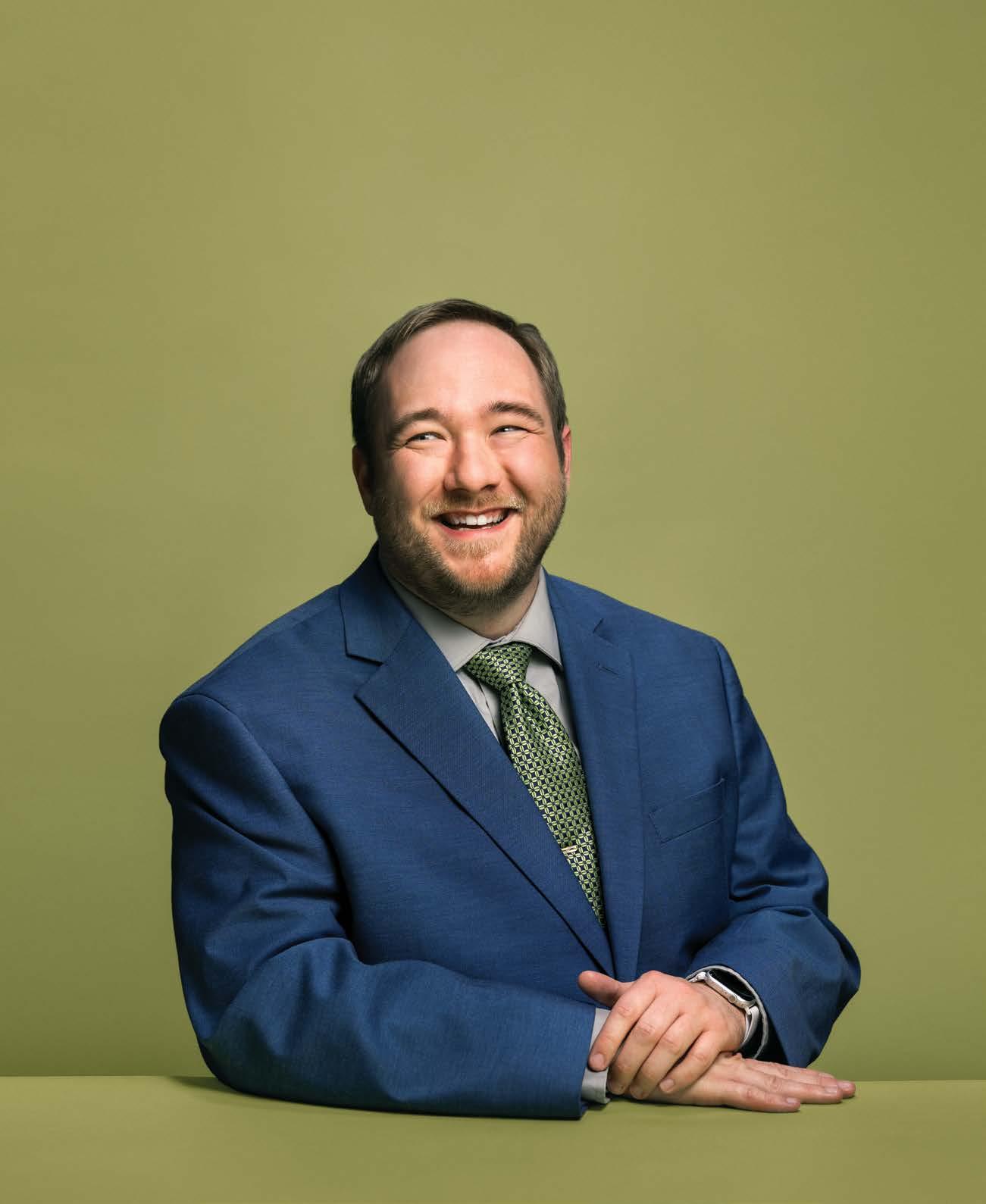
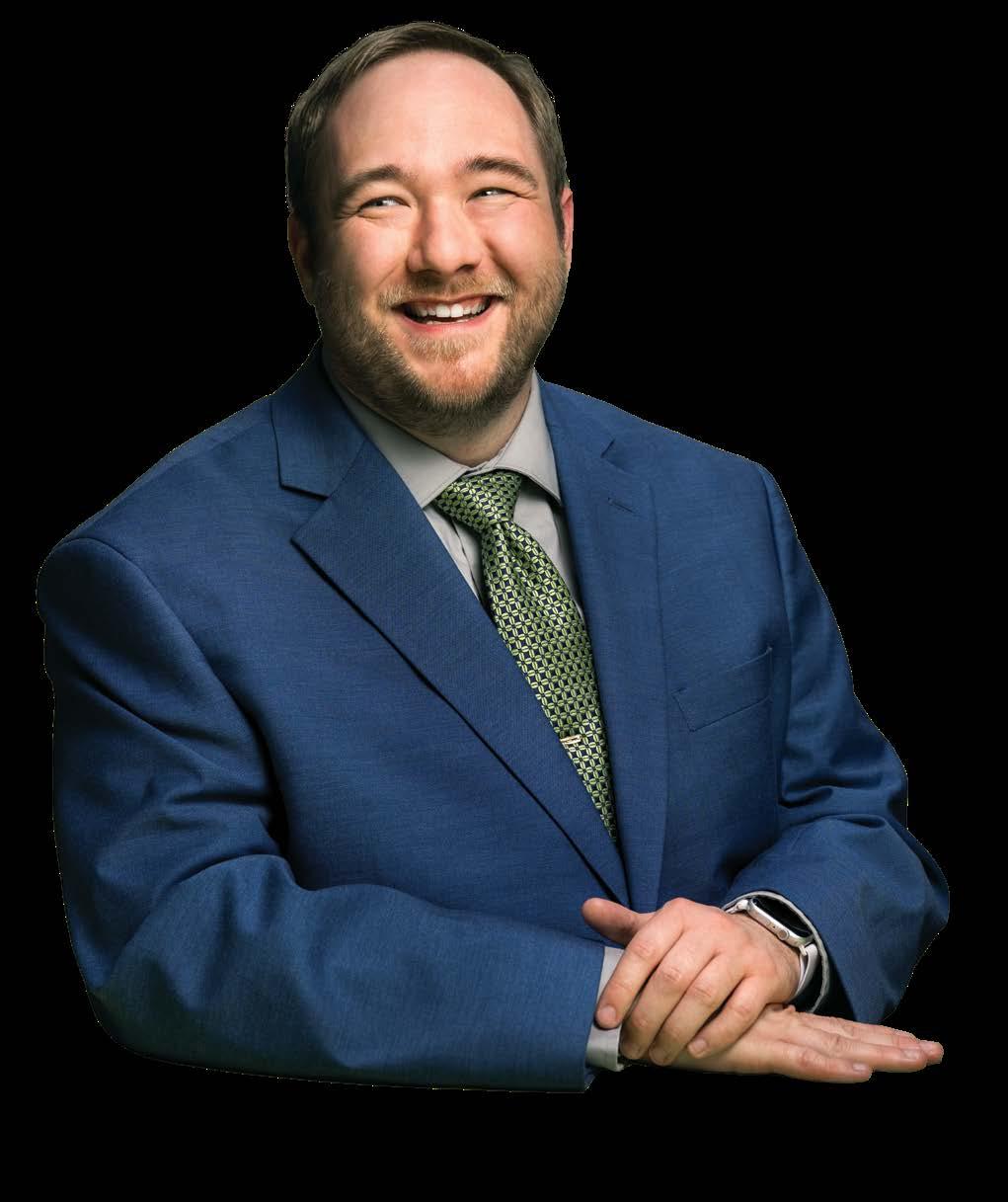
Kiko Macias (’25 J.D.) is a lot of things — ambitious, compassionate, generous, hopeful. But, above all, he is resilient.
Born in Albuquerque, Macias spent much of his childhood reflecting on his ancestral history. His family were migrant farmworkers from Mexico and their lives centered around the changing seasons and crops — moving to California, New Mexico, Colorado, Wyoming, and Kansas. Life seemed limited to the confines of the camps they stayed in. But he remembers the stories of his family’s involvement in the Chicano Movement and the many lawyers and activists who fought for basic civil rights for their fellow immigrants and Latino colleagues. These stories set the tone for his destiny.
At 16, after a series of heartbreaking conflicts at home, Macias was emancipated from his family. He moved to California to play professional soccer for the San Jose Earthquakes Academy. Upon graduating high school, he decided to give up his dreams of professional soccer to get a college degree.
“I decided I’d rather try to own the team than play for it,” he says, both joking and not. Macias has a way of making grand statements like this feel charming and natural.
While in college in San Antonio, Texas, Macias worked a summer internship with a nonprofit called RAICES, an organization that helps asylum seekers detained at the border. This experience, combined with those from his childhood, led Kiko to contemplate ways to streamline the immigration process. As part of a competition for entrepreneurs, he launched Monarch Migration, an app designed to help individuals navigate the incredibly complex immigration bureaucracy. It advises users on the best country and legal path to pursue, guides them through the application process, and even supports their integration through education, employment, and social services.
“We have an inherent right to migrate,” he states. “However, it is essential to establish a system that promotes legal migration and makes it appealing. We utilize modern technology along with humanitarian principles to foster that.”
Macias chose Gonzaga for law school, in part because Spokane is so friendly to tech start-ups like his.
“The public library provides entrepreneurs access to these amazing databases,” he says. “I can get the same tech for half the price.”
This company would be ambitious enough for most people finishing law school, but its success is just one of Macias’s many goals. He has his sights set on politics — state, national, or both. But first, he’d like to become a diplomat, maybe even an ambassador. The first step in realizing this dream is an LL.M. in international tax, which he plans to pursue next year in Chicago at Northwestern Pritzker School of Law. After his undergraduate degree, Macias worked for the Consulate of Belgium, an experience that opened his eyes to the world of international trade and diplomacy. In his position, he routinely sat in on meetings with representatives from Belgium, the Czech Republic, Namibia, Mexico, and more.
“I loved seeing the facilitation of diplomacy,” he says. “All of it. The negotiation, the drafts of the contracts, and just all the different cultures. They’re all so beautiful.”
For Macias, the answer to so many of the world’s problems is right out in the open. It’s love and mutual respect.
“I have seen and experienced so much hate in this world,” he says with tears in his eyes. “In the end, we are all the same. We are one family.”
“We have an inherent right to migrate. However, it is essential to establish a system that promotes legal migration and makes it appealing. We utilize modern technology along with humanitarian principles to foster that.”


When students step into Gonzaga Law School and start their first year, they dive into a mix of hands-on learning alongside traditional legal theory courses. These foundational classes set the stage for the more real-world experiences that await in their second and third years. The shift from abstract legal ideas to tangible, real-life practice hits home when students roll up their sleeves in clinics or externships. This is when many students start to find their path and “connect the dots,” says Professor Genevieve Mann (’03 J.D.), a supervising attorney in Gonzaga’s Clinical Legal Programs for over 11 years.
“It’s easy to sit in a classroom and wonder, ‘Why did I choose this? It feels so disconnected from real justice,’” says Mann. “But then you’re sitting across from someone in a clinic, and you realize that, as a law student, you have the power to change their life for the better. That moment reignites your passion and excitement for doing this work.”
This sentiment has been felt by law students for generations and is what led to the creation of University Legal Assistance, now formally known as Gonzaga Law School – Clinical Legal Programs. For more than 50 years, Clinical Legal Programs has been creating opportunities for students to gain confidence in their advocacy skills while supporting the greater Spokane community.
Father Bryan Pham, S.J., supervising attorney and law school chaplain, describes a “transition moment,“ when students start to see clients and develop what kind of lawyer they want to be and how they will engage with clients. Students manage anywhere from six to 12 cases independently,
with access to a supervising attorney, during a semester in one of the 10 active clinics.
“The clinical experience is like jumping into the deep end of a pool with a lifeguard and the supervising attorneys are the lifeguards,” explains Fr. Pham. “When I was going through law school we didn’t have these kinds of opportunities; we didn’t step into a courtroom until after we passed the bar.”
Clinic students have the opportunity each week to sit down and talk oneon-one through challenges or even emotions that come up as they do this work. Mia Irvin (’25 J.D.), this year’s commencement student speaker, says this kind of attention and guidance was pivotal in her experience.
“I put a lot of pressure on myself to give people good news,” she explains. “But my clinic supervisor reminded me that oftentimes people are not looking for the perfect answer, they are just looking for an answer.”
Students also participate in a weekly seminar to learn skills together.
“I do a lot of little things to teach empathy and listening,” Mann says. “I frequently tell the students, ‘You need to be listening to listen, not listening to speak.’”
Clinical Legal Programs is a meaningful and often pivotal experience for students. The guidance of insightful individuals in and outside Gonzaga who understood the value of first-hand experience in the learning process has been key. This includes George Critchlow (’77 J.D.), professor emeritus and one of the first directors of the program.
Critchlow became the director in 1980. After accepting the job, he says, “I thought it would just be for a year or two. It turned into a lifetime career opportunity.” Indeed, it was a major opportunity to lead and shape a program that, at the time, was on the cutting edge of clinical work.
“No matter their reputation or region, most law schools had the same kind of curriculum,” Critchlow says. “You’d go for three years, take the same courses, in the same sequence, for the same number of credits. The idea was that students learn best by engaging in the intellectual exercise of the Socratic method in a classroom.”
This began to shift in the 1960s as emphasis focused on civil rights, women’s rights, and anti-war activity. Critchlow says it quickly became apparent that law students needed to be sensitized to issues they’d be practicing in a way that couldn’t just happen in a traditional classroom.
“They would learn knowledge in the classroom. And that’s good — the bar exam tests knowledge,” he continues.
“But what students really need are skills. How do you practice law? How effective are you when it comes to working with a client? Becoming proficient in these areas is different than memorizing a rule of law or reading a case.”
Critchlow likens it to a medical resident. “You can’t imagine a doctor getting out of medical school without actually having seen and participated in some kind of treatment with patients. That wasn’t the case in law school at the time, but it needed to be.”
“The most satisfying part was creating a program where students could get back in touch with their passion and purpose.”
— George Critchlow
Over the past few decades, Gonzaga Law School branched the program into several specialized areas including the Intellectual Property Clinic and the Lincoln LGBTQ+ Rights Clinic, which is one of only nine clinics dedicated to LGBTQ+ issues in the United States.
Allowing students to explore handson work in these niche areas accomplished several important things. It connected the University to the Inland Northwest community, allowing underrepresented populations to receive representation they might
not otherwise receive. And it helped students discover their role in the legal system and remember why this work is important.
“For many students, there’s this kind of disconnect between the reason they came to law school and the reality,” says Critchlow. “The process can sometimes squeeze out the enthusiasm. The very reason that people are in school can suffocate them and make them lose touch with that piece of their soul that caused them to go to school to begin with.
“For me, the most satisfying part was creating a program where students could get back in touch with their passion and purpose. I loved being in a position where I could help students and see them open up and start smiling when they remember how cool it is to be in law school.”
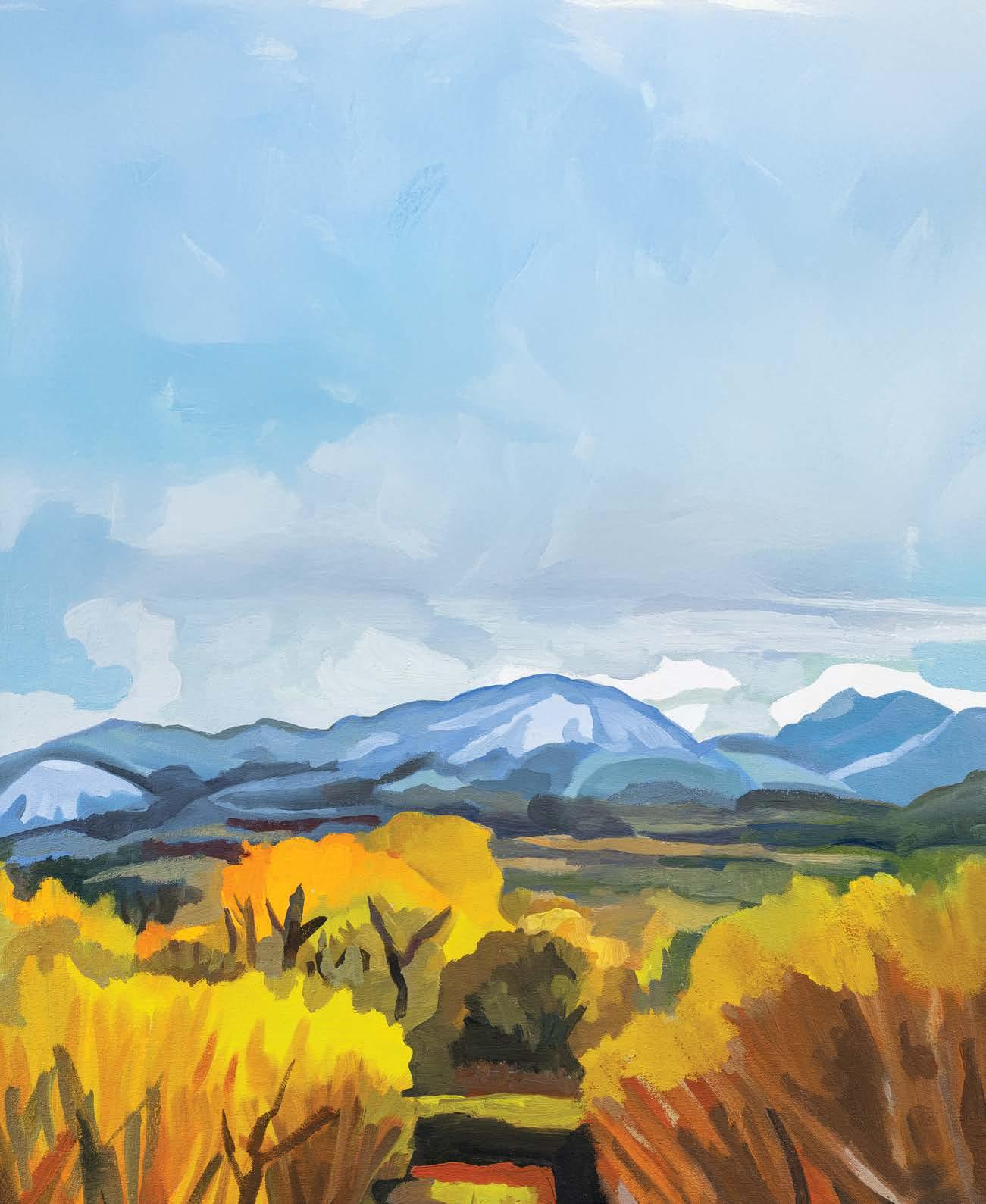
Give today to support Gonzaga Law School Clinical Legal Programs by scanning the QR code or visiting gonzaga.edu/lawgive/CLP

When Olawale (Wale) Olumodimu came to the United States to complete an LL.M. from Tulane, he was a successful corporate lawyer with a thriving practice in Nigeria. He worked hard his whole life, rising through his country’s rigorous education system, and was enjoying the first fruits of his tremendous labor. He thought his time here would further his success in corporate law, but then he encountered Professor Adeno Addis who changed the direction of his life. Wale swiftly let go of his aspiration for a corporate law career and instead pursued a growing fascination with academia, favoring international and comparative law topics.
“It was never my desire to stay in the U.S.,” he says. “But Professor Addis made me understand that the law is a tool of social engineering. And even when your voice cannot be heard, it can be heard in writing.”
This message still resonates with Wale long after completing his LL.M. and S.J.D. He made the decision to leave behind the lucrative world of corporate law – and his home in
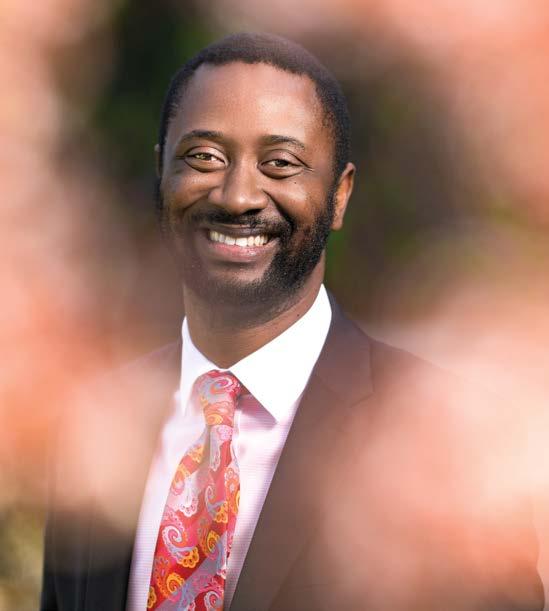
Nigeria – to devote his energy and attention to public international law, with a focus on national, regional, and international legal protection frameworks for internally displaced persons (IDPs), victims of enforced disappearance, refugees, and stateless persons.
“The more classes I took, the more I saw the need to serve these vulnerable people,” he says.
While at Tulane, Wale researched and wrote his doctoral dissertation on IDPs, people who are homeless in their homeland because of things like violence, ethnic clashes, religious intolerance, and natural disasters. He noticed an asymmetry where refugees, or externally displaced persons, are guaranteed rights under international law that IDPs are not.
“I saw this and I thought that it was unfair,” he says of the world’s IDPs. And while there have been continental and regional agreements, like the Kampala Convention, adopted by the African Union in 2009, and the Great Lakes Pact of 2006, Wale points to difficulties in implementing the law and policy measures that the continent agrees to in theory.
“I’m trying to tell the governments to do their job,” he says. “There are already laws, there is already support, with little or no implementation mechanisms.”
His work has since expanded to include stateless persons. These are individuals who do not officially belong to any nation.
“I’ve called them people who have been expunged from humanity,” he says. “Nationality is the way we enjoy our basic rights. And there are people who do not have that.”
Now an assistant professor, Wale brings his rich and comparative international perspective to all his classes, particularly Constitutional Law. He’s able to draw on his experience of Nigerian, British, and American systems and lead engaging discussions on the merits and demerits of each. And while he hasn’t been back to Nigeria in 10 years, he’s found a sense of belonging at Gonzaga.
“I feel valued here,” he says. “I feel accepted.”
As for the future, Wale hopes to continue to inspire students to find the power in their voice, just as his professor once inspired him.

Professor Erica Goldberg believes in the clarifying power of the First Amendment. She might disagree with your perspective, but she wants very much to hear it, and she remains open to the possibility of being convinced. Much of her scholarship – and her teaching – lives inside this tension.
Having grown up in a “dialogue-heavy household” in Brooklyn and New Jersey, she has long been a champion of tolerance, patience, and clarity. “Communication is the most important thing in your relationships,” her father used to advise her. This foundation shaped her approach to education and, eventually, the law.
“I just loved school,” she says. In college, she majored in both biology and English. And her love of learning extended beyond her own studies. She regularly tutored classmates and helped them prepare for their exams – her own schoolwork wasn’t enough to satisfy her appetite for new ideas. For a while though, her reverence for her professors

led her to believe she couldn’t become one. She still has to pinch herself sometimes. “It’s such a privilege to be in an academic environment.”
After graduating from Stanford Law School, Goldberg clerked for a federal judge on the Sixth Circuit and developed a passion for appellate work.
“I love making the law clearer, fairer, and more beautiful,” she says of this experience. “It’s as close as you get to being an academic while still practicing law.”
Goldberg ultimately wanted to approach legal questions from a more objective standpoint than practice would allow, which led her back to academia.
At Gonzaga, she works hard to create classroom environments where diverse viewpoints can sit side-byside and ideas can compete on a level playing field. This is increasingly rare, but Goldberg says her students crave it. It forces students to explore the weaknesses in their own arguments, rather than just trusting their strengths.
“The best thing you can do in an argument is anticipate objections and have comebacks to them,” she says. “It’s so beneficial to encounter someone who disagrees with you.”
Things don’t always go smoothly, though, and she has to be prepared for conflicts.
“I try to keep hot issues rooted as much as possible in the law,” she says. “But I really believe in getting all views on the table.”
Goldberg’s teaching reflects her deeper commitment to the truth, the pursuit of which has always animated her curiosity. This is what initially drew her to logic and literature, both of which affirm the innate beauty of the human mind.
“I’ve always believed that one of the purposes of life is to get closer and closer to the truth,” she says. “That’s why I’m such a big proponent of academic freedom.”
In modeling how one can maintain an impartial, objective framework for decision-making, Goldberg is preparing her students not just for the law, but for life itself.
As a professor for more than two decades, Sandra Simpson has used a dynamic, hands-on learning model devoted as much to developing skills as acquiring knowledge. And the world seems to have caught up with her way of doing things. As Gonzaga’s new director of experiential learning and institutional assessment, Simpson hopes to use her pedagogical expertise to help better prepare students for the NextGen Bar Exam and, ultimately, for life as a lawyer.
“When I went to law school, I got a very high-level doctrinal education, driven by mastering subject matter,” she says.
“But I did not get exposed to many of the skills I needed in my practice. I want to make sure our students get that practical experience.”
This perspective has shaped her approach to legal education since she joined Gonzaga’s faculty in 2007. And she hopes her passion is contagious.
“Learning should be fun, first and foremost,” she says. “It might be hard, but students should be having a good time.”
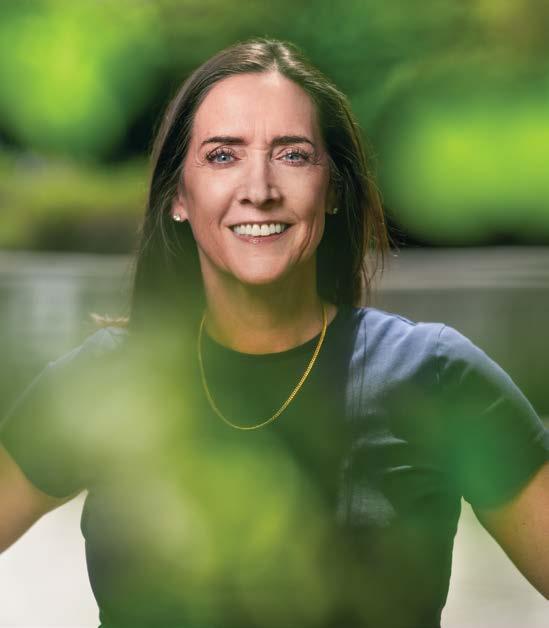
Simpson’s philosophy evolves around the basic idea that clients don’t come into a lawyer’s office with a clear knowledge of their own case.
“They don’t come in with constitutional law written across their foreheads,” she says, laughing. “They come in with a story. The lawyer must be able to spot the legal issues in that story. This issue-spotting knowledge comes from doctrinal knowledge. As any practicing lawyer will tell you, issue-spotting is only the first step in the process. Lawyers also need to understand how to apply lawyering skills to those legal issues. The law school’s job is to ensure our students have the tools they need to apply their skills and knowledge to competently and ethically represent their clients.”
This simple idea is the foundation of Simpson’s new role, created to ensure students know how to apply the theoretical knowledge they’ve acquired to real-world problems. Part of Gonzaga Law School’s experiential program is the new Lawyering Skills course. Simpson and three other colleagues developed a Lawyering Skills class that takes students through the entire legal process, from meeting the client, to interviewing witnesses, to drafting the complaint, to creating discovery requests, and ending with settlement negotiations. The professors built the class around a fictional group of tenants who were losing their affordable housing to a new, high-end development. The students researched the causes of action the tenants may have under federal and state law.
With Washington adopting the NextGen Bar Exam, the timing of this new position couldn’t be better. The new exam places more emphasis on practical skills, bridging classroom learning with professional readiness. As the students move through the curriculum, Simpson hopes to create benchmarks and assessment rubrics to measure their development and attainment of these lawyering skills.
“Part of my job is to coordinate our experiential learning opportunities so we are all rowing the boat in the same direction,” she says, pointing out how willing faculty and staff are to get involved.
“That’s the thing I love about Gonzaga – everybody is looking out for the students. From the staff all the way up to the dean, we just want what is best for the students.”
When the Conaway Family Children and Parents Representation and Justice Initiative (CF-CRJI) was first announced in fall 2024, it marked a bold commitment to transforming how the legal system serves children and families. One year later, that commitment is already bearing fruit.
What began as a single course offering is now a robust Child Rights & Advocacy concentration, and a formal partnership with the Office of Civil Legal Aid and the Office of Public Defense. The launch of CF-CRJI itself has been transformative – thanks to the generous support of Josh (’03 J.D.) and Janae Conaway, whose gift brought that vision to life.
Graduates of the concentration are now launching careers in child advocacy across Washington, California, and Nevada. Their success demonstrates CF-CRJI’s early impact, not just as an academic program but as a pipeline to purpose-driven legal careers.
Over the past year, CF-CRJI has expanded its reach across curriculum and community – appointing Crystal Gamache as program developer and introducing new courses that bring seasoned child advocates directly into the classroom. The program’s community presence is also growing. Students are volunteering as court-appointed special advocates and participating in guided tours of local youth shelters and dependency programs to gain firsthand insight into the systems they aim to reform.
Looking ahead, the first cohort of a new summer fellowship supporting funded internships in child advocacy settings will be selected this year. Locally, CF-CRJI is collaborating with juvenile attorneys to create externships for students – ensuring the next generation of youth advocates receive both an education, and hands-on experience.
These developments reflect CF-CRJI’s founding vision – to meet the critical need for attorneys who are willing and qualified to represent children with excellence, compassion, and expertise. CF-CRJI is a growing force, preparing students to lead in one of the most vital areas of legal practice today.

When Crystal Gamache was first accepted to Gonzaga University as a college freshman, she wrote her admissions essay about the foster children who came through her home growing up, and her dream of one day making a difference in their lives.
“I didn’t know what form that would take,” she recalls. “But I knew it was wrong that my teenage foster sister cried herself to sleep after the state took her baby. I knew kids were being hurt by the very systems meant to protect them. And I knew no one was in their corner.”
Nearly 20 years later, Gamache is back at Gonzaga as the inaugural program developer for CF-CRJI. And this time, she knows exactly how to help.
She approached Gonzaga with a vision – to build a child rights curriculum that trains lawyers to do the job right.
“I watched the system fail over and over, from both sides of the equation,” she says. “I carry that into every lecture, every training, every conversation with students. This isn’t just about law – it’s about some of the most vulnerable people you will ever meet.”
Her goal is to train students not only to represent children – but to believe them, to understand them, and to fight for outcomes that promote healing and dignity.
Gonzaga’s mission – to educate students for lives of leadership and service for the common good – comes alive through CF-CRJI. The initiative ensures students graduate not only practice-ready, but purpose-ready.
“We’re not just reacting to a legal change. We’re building a generation of lawyers who can lead it.”
“We’re not just reacting to a legal change. We’re building a generation of lawyers who can lead it.”
This past year has been an incredibly successful one for the Gonzaga Law faculty, producing scholarly works on a wide range of timely, important topics, with placements in some of the most prestigious law reviews. Below are notable recent and forthcoming publications.
102 Washington University Law Review 479 (2024)
By Luis Inaraja Vera, Assistant Professor of Law
Legal transitions—that is, changes in legislation, regulations, or judicial decisions—are necessary to improve any legal system. This process, however, is fraught with obstacles and hard decisions mainly because, while society may gain, some individuals will suffer under the new rule. Building on the legal transitions literature, strategies used in other water-scarce countries, and historical transitions in water law, this Article provides an in-depth analysis of the policy and constitutional implications of addressing the current water crisis by employing one of the less theorized forms of transitional relief: delayed implementation. When compared to more traditional alternatives, delayed implementation will make the adoption of these legal changes more politically viable, reduce their vulnerability to constitutional challenges, and lead to fairer and more efficient outcomes.
Professor Inaraja Vera researches environmental and natural resources law. His other recent article, Voluntary Regulation, was published in the Harvard Environmental Law Review.
“Gruesome Logic”: The Tucson No More Deaths Prosecutions and Religious Liberty
5 North Carolina Civil Rights Law Review 1 (2025)
By Kristina Campbell, Professor of Law, Director of the Beatriz and Ed Schweitzer Border Justice Initiative, and the
Rita G.
and Norman L. Roberts Faculty Scholar
Every year, hundreds of migrants die crossing the desert in the American Southwest on their journey to safety in the United States. In response, groups of humanitarian volunteers of faith and conscience—united by the belief that “humanitarian aid is never a crime”—came forward to provide lifesaving water, shelter, food, and medical aid to those in need of assistance in the desert. Instead of
being lauded for their life-saving actions, humanitarian volunteers were threatened, harassed, and in the most extreme cases, criminally prosecuted by the federal government for harboring undocumented immigrants. This Article reviews the recent criminal alien smuggling prosecutions of humanitarian volunteers for the Arizona nonprofit organization, No More Deaths, and offers suggestions regarding how concerned individuals of faith and conscience can continue to safely provide humanitarian aid to vulnerable migrants in need in the desert Southwest.
Professor Campbell focuses her research on the intersection of immigration, civil rights, race, and the law. Her other recent article, Living Pro Bono Loco: My Year in the Access to Justice Gap and the Humanitarian Refugee Crisis in the American Southwest, was published in the Richmond Public Interest Law Review.
Angela Aneiros, Assistant Professor of Law, focuses her research on the intersection of law and corporate governance. Her article, Reincorporation: The Trojan Horse of Self Dealing, was published in the Baylor Law Review. Her article, Limiting the Power of Superstar CEOs, was published in the Berkeley Business Law Journal. Her coauthored article, Sex and Gender in a Business Law Class, was published in the Midwest Law Journal.
Michael Cecil, Assistant Professor of Law, researches jurisprudence, constitutional theory, and structural equality. His article, Law as Integrity and the Alien Tort Statute, was published in the Harvard Human Rights Journal. His article, Structural Guarantees: How the Constitution Combats Unequal Distributions of Liberty and Opportunity in the State, will be published in the New Mexico Law Review.
Dallan Flake, Associate Dean of Faculty Scholarship, Associate Professor of Law, and Clute-Holleran Scholar in Corporate Law, researches the legality of workplace religious accommodations. His article, Valuing Worker Authenticity, was published in the William and Mary Law Review. His article, Undue Hardship After Groff, was published in the Employee Rights and Employment Policy Journal His article, The Curious Case of Religious Accommodation, was published in the Saint Louis University Law Journal
Jason Gillmer, John J. Hemmingson Professor of Civil Liberties, is a legal historian with a focus on the antebellum South, the conquest of the American West, and the Civil Rights era. His article, Pearson v. Pearson: A Story of Slavery, Marriage, and the West, Told in Black and White, was published in the Michigan Journal of Law and Society.
Brooks Holland, J. Donald and Va Lena Scarpelli Curran Professor of Legal Ethics and Professionalism, focuses his research on the intersection of professional responsibility, criminal law, human rights, and social justice. His article, Is the ‘Moment of the Threat’ the Total Totality of Relevant Circumstances for Evaluating Excessive Police Force Claims?, was published in the U.S. Supreme Court Preview Journal. The third edition of his casebook, Learning Professional Responsibility: From the Classroom to the Practice of Law, is forthcoming.
Jessica Kiser, Associate Professor of Law, researches intellectual property issues related to emerging technologies, trademark law, brandbuilding, and strategic business development. Her article, Tradition is a Trap, was published in the Pittsburgh Law Review. The eighth edition of her coauthored casebook, Fundamentals of U.S. Intellectual Property Law: Copyright, Patent, and Trademark, was published by Wolters Kluwer.
Genevieve Mann, Assistant Professor of Law, researches and writes in the area of elder law, with a focus on reimagining legal tools that sit at the intersection of client self-determination and empowerment. Her article, Transforming Teaching Through Theatre, will be published in the Clinical Law Review.
Agnieszka McPeak, Associate Dean for Academic Affairs and Program Innovation and Frederick N. and Barbara T. Curley Professor of Commercial Law, researches and writes on the intersection of law and technology, particularly as it relates to social media, ethics, privacy, and the innovation and sharing economies. Her essay, AI, Ethics, and Augmented Lawyering, will be published in the Toledo Law Review.
Ann Murphy, Professor of Law, focuses her research on tax and evidence issues. Her update, Evidence Privileges, in Federal Practice and Procedure (commonly known as Wright & Miller), was published. Her article, Nothing to Gain: The Disparate Impact of the Capital Gains Tax Preference on Women and Persons of Color, will be published in the Nevada Law Journal.
Olawale Olumodimu, Assistant Professor of Law, examines emerging legal concerns of the rights of internally displaced persons, stateless persons, and refugees. His article, Federalism: Analyses of Economic Effects of Domestic Violence on Interstate Commerce Under the U.S. Constitution, was published in the Saint Louis University Law Journal
Jeffrey Omari, Assistant Professor of Law, is a legal anthropologist whose research on the intersection of law, technology, and social science merges ethnographic fieldwork and anthropological theory with doctrinal analysis. His article, Political Disinformation in the Anthropocene, was published in the Washington and Lee Law Review. His coauthored book chapter, Informality and the Internet: Alternative Visions of Technological Governance in Brazil, was published in Technology and Governance Beyond the State (Routledge Press).
Drew Simshaw, Assistant Professor of Law, writes about the interplay between emerging legal technologies and legal ethics, access to justice, and legal education. His article, Interoperable Legal AI for Access to Justice, was published in the Yale Law Journal Forum. His keynote address to the Georgia State University College of Law’s 29th Annual Law Review Symposium was published in the Georgia State University Law Review.

Gonzaga University School of Law is excited to welcome the following new faculty.

Judge Tim Fennessy (’79, ’83 J.D.)
Distinguished Visiting Assistant Professor
Judge Tim Fennessy joined Gonzaga Law in spring 2025 as a visiting assistant professor. Beginning fall 2025, he serves as a distinguished visiting assistant professor. He brings a wealth of practical legal experience to the classroom. As a graduate of Gonzaga Law School, Judge Fennessy practiced law in Spokane for more than three decades, primarily as a litigator. His career included extensive experience in trial courts across Washington and Idaho, where he represented clients in civil and family law cases. He appeared before the Washington State Supreme Court, the Idaho State Supreme Court, and the Washington State Court of Appeals, honing his skills in client counseling, discovery, case evaluation, and witness preparation. In 2016, Judge Fennessy was elected to the Spokane County Superior Court, where he served eight years and presided over numerous family law trials, jury trials, and civil and criminal motions. Notably, he held leadership roles as chief criminal judge from 2023 to 2024 and as the presiding judge in 2024. He also served the Law School as chair of the Board of Advisors and as a director of the Gonzaga Law School Foundation. As visiting assistant professor, Judge Fennessy taught Lawyering Skills classes, sharing his extensive experience and knowledge with students at Gonzaga Law. In addition to teaching Lawyering Skills, he also teaches Construction Law, Foundations of Appellate Law, and Remedies.

Nick Marquiss Assistant Professor Nick Marquiss joined the Gonzaga Law faculty in fall 2025 as an assistant professor. He previously served as an associate attorney at the law firm of Perkins Coie in Seattle, where he worked in the antitrust & unfair competition practice group. Before joining Perkins Coie, Marquiss clerked for the Honorable Joan L. Larsen of the U.S. Court of Appeals for the Sixth Circuit, and as a law student he externed with the U.S. District Court for the Western District of Washington. He also worked for Gibson, Dunn & Crutcher in Washington, D.C.
A Spokane native, Marquiss earned his J.D. from Vanderbilt Law School, where he also received a Ph.D. in law and economics. While there, he served as both senior articles editor for the Vanderbilt Law Review and articles editor for the Environmental Law and Policy Annual Review. He received his B.A. in economics from Whitman College. His teaching package includes Contracts, Antitrust, and Health law.
Abe Ritter
Assistant Professor
Abe Ritter, a Gonzaga alumnus, has been an integral part of the Gonzaga Law community since 2018. Previously serving as the associate director of the Center for Professional Development and Externships, he helped manage the Externship Program and taught seminars designed to prepare students for the challenges of legal practice. Formerly a visiting assistant professor, Ritter started as a tenure-track assistant professor in fall 2025.
Ritter’s scholarly interests include behavioral legal ethics, systems and practices in criminal courts, and experiential learning pedagogy. As a former deputy district attorney in Colorado, Ritter litigated over 75 jury trials, including 60 solo jury trials. He is teaching Professional Responsibility, Evidence, Trial Advocacy, and Lawyering Skills and continues to contribute to the legal profession as a member of the Washington State Bar Association, the WSBA Council on Public Defense, and the Colorado State Bar.

Gonzaga Law is also excited to welcome two new visiting assistant professors, Sonya Garza and Conrad Sturm, for the year. Garza comes from the University of Memphis, Cecil C. Humphreys School of Law. She is teaching Constitutional Law, Professional Responsibility, Drafting for Litigation, and Comparative Women’s Rights. Sturm joined Gonzaga Law from the University of Detroit Mercy School of Law and teaches Business Associations and Legal Writing courses.
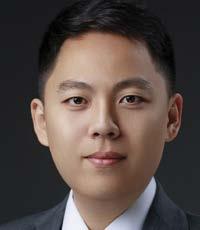
Kai Wang
Assistant Professor
Kai Wang joined the faculty as a tenure-track assistant professor in fall 2025. Wang’s research focuses on financial regulation, particularly the regulation of cryptocurrency, banks, and payment systems. His most recent article, “Exploring Cryptocurrency Payments in the Context of U.S. Anti-Money Laundering Law,” is forthcoming in the University of Chicago Business Law Review.
Wang earned both his J.S.D. and LL.M. degrees from Cornell Law School, where he served as an articles editor for the Cornell International Law Journal. His career includes significant international experience, having worked for the International Monetary Fund’s legal department, the Asian Development Bank’s Office of Anticorruption and Integrity, and the United Nations Security Council’s Counter-Terrorism Committee Executive Directorate. His expertise in financial regulation and international law will make a significant contribution to Gonzaga Law’s Center for Law, Ethics & Commerce.
“We are excited to welcome Tim Fennessy back to Gonzaga Law School as a distinguished visiting assistant professor. We also are thrilled that Abe Ritter joined our permanent faculty, and that Kai Wang and Nick Marquiss are new members of the ZagLaw community,” said Smithmoore P. Myers Dean Jacob Rooksby. “These appointments reflect our ongoing commitment to providing students with a diverse, highly experienced, and dedicated faculty who are leaders in their respective fields.”
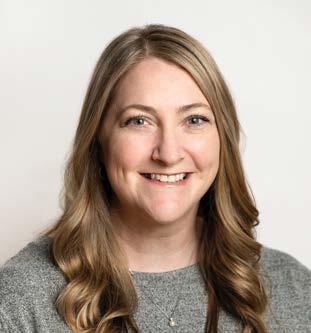
Reflecting on 55 years of the Gonzaga Law School Foundation
Sometimes the most unexpected journeys begin with a single step in a direction we never imagined. When I joined Gonzaga University School of Law in 2010, I never envisioned that more than a decade later I would find myself helping to shape the future of one of its most lasting legacies. Yet on May 1, 2023, I became the first full-time executive director of the Gonzaga Law School Foundation — a role that honors our past and shapes our future.
The GLSF’s Board of Directors created this position to strengthen our operations, fundraising, and alumni engagement. It was a bold and forward-thinking move, and I was deeply honored to be chosen to lead this next chapter. My journey to this role was shaped by years of working alongside passionate colleagues, dedicated alumni, and generous donors who believe in Gonzaga Law’s mission.
As we celebrate the Foundation’s 55th anniversary in 2025, I reflect on its remarkable history. The GLSF was incorporated on February 3, 1970, by Dean Lewis Orland, Rev. Charles Walsh, S.J., Joseph Nappi, and Ronald Wyse. Stories suggest the GLSF was born out of student protest, specifically dissatisfaction with how law student tuition was used to support the broader university during a financial strain. The spirit of advocacy and stewardship that may have surrounded its founding continues to inspire my work today.
Over the decades, Gonzaga Law has grown in both vision and impact. Key milestones include:
1970
Establishment of day classes and GLSF
1975
Establishment of the Clinical Legal Programs (formerly known as University Legal Assistance or “the Clinic”)
1979
Launch of the Law School Annual Fund 1980
Establishment of the Thomas More Scholarship Program 1991
Establishment of the Institute for Law Teaching & Learning 2000
Opening of the current Law School building 2006
Creation of the Center for Law, Ethics & Commerce (formerly known as Center for Commercial Law)
2008
Establishment of the John J. Hemmingson Chair in Civil Liberties
2017
Launch of the Center for Civil and Human Rights
2018
Completion of the Gonzaga Will Campaign, to which the Law Foundation contributed $12M 2020
Founding of the Lincoln LGBTQ+ Clinic and the Schweitzer Immigration Clinic 2021
Dedication of the Chief Justice Mary Fairhurst (’79, ’84 J.D.) Bench-Bar Room and the establishment of the Carl Maxey (’51 J.D.) Social Justice Scholarship Program (formerly the Thomas More Program)
2024
Creation of the Louis and Jean Conaway Community Project and the Conaway Family Children and Parents Representation and Justice Initiative (CF-CRJI) 2025
Opening of The Common Grounds, a new space for connection and collaboration
Today, the Foundation manages more than $34 million in assets, a testament to decades of generosity and careful stewardship. That financial strength allows us to support scholarships, student success, and alumni engagement in meaningful ways. It also challenges us to think boldly about how to grow our impact in the years ahead.
I never set out with this role in mind, but every step along the way prepared me for it. Serving as executive director has been one of the greatest honors of my career — a role that connects the legacy of those who came before with the promise of what lies ahead.
I’m proud to be part of a story that began more than half a century ago, and I’m energized by the opportunity to help shape its future.
So, here’s to the next chapter. As J.R.R. Tolkien wrote in “The Fellowship of the Ring”: “Maybe the paths that you each shall tread are already laid before your feet, though you do not see them.”

Sarah Guzmán (’18 M.A.)
Executive Director, Gonzaga Law School Foundation
Give today to support Gonzaga Law School Foundation Annual Fund by visiting gonzaga.edu/lawgive/AnnualFund
For Renee Reuther (’87, ’90 J.D.), Gonzaga University is more than her alma mater — it’s where she found her voice, purpose, and lifelong community.
“Raised by a single mother, I relied on scholarships, financial aid, and support from Gonzaga to pursue law school,” she says. “It changed the course of my life.”
Now a prominent Las Vegas attorney and Gonzaga University trustee, Reuther remains an active supporter of the School of Law — giving annually and staying closely connected to classmates across the country.
“Just last week, I caught up with more than a dozen law school friends,” she says. “That community is still very meaningful to me.”

To ensure future Zags receive the same life-changing opportunity she did, Reuther included Gonzaga in her estate plans, designating a gift to the endowed scholarship named in honor of her late mother.
“When you start thinking about your legacy, you realize how powerful a gift like this can be,” she says. “It’s my way of paying forward what Gonzaga gave to me.”
Her message to fellow ZagLaw alumni: “No gift is too small. A planned gift can make a lasting difference.”
To learn more and lock in your legacy, contact Gonzaga’s Office of Planned Giving at plannedgiving@gonzaga.edu or visit gonzaga.edu/plannedgiving
“Remember, when you leave this earth, you can take with you nothing that you have received, only what you have given.”
— St. Francis of Assisi
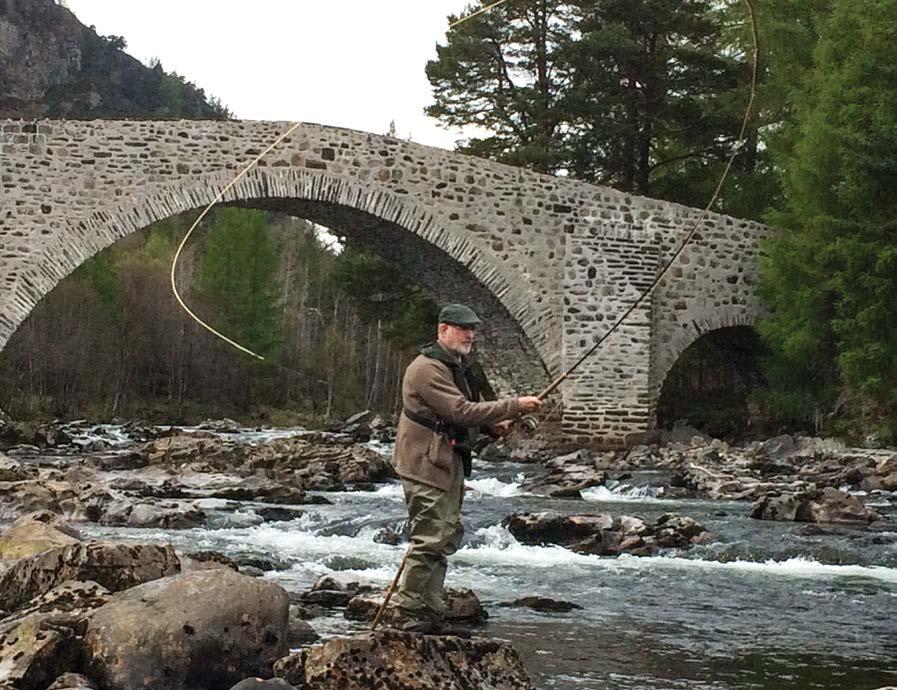
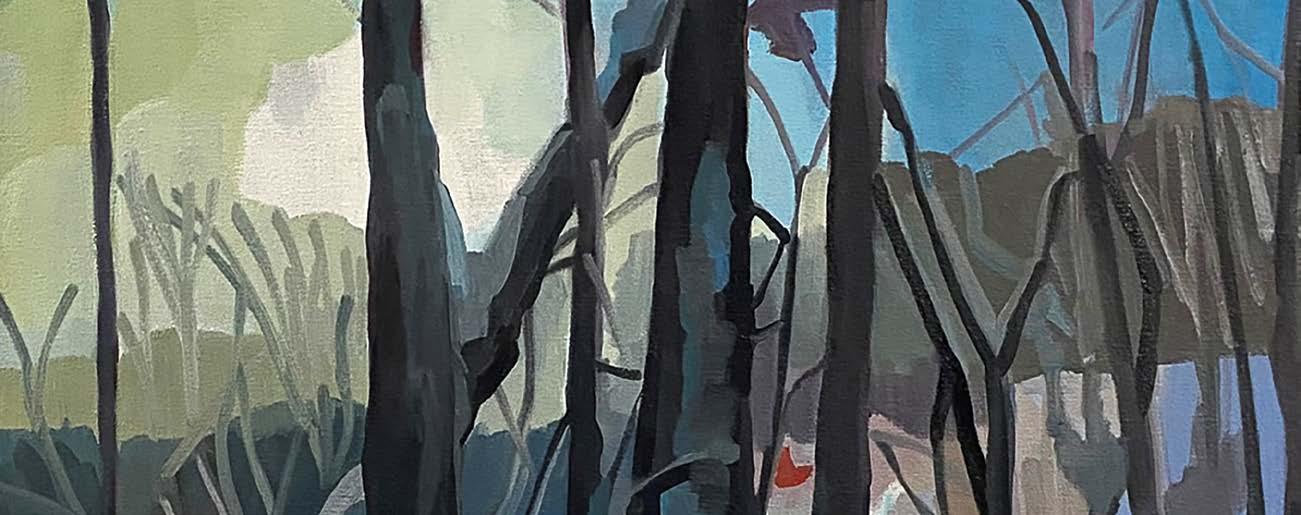
Everything is bigger in Alaska. And it was about the only place that could contain the remarkable life of Yale Metzger (’95 J.D.), who passed away last summer.
Born in Michigan, Yale spent time in Tennessee and Texas before deciding to move to Alaska. He graduated from high school at 16 and, at 18, became a police officer – his first step in a lifelong commitment to justice and serving others.
“Helping people was important to him, but he decided he wanted to help people in a different way,” recalls his wife, Susan Richmond. This passion led him from the military to maritime investigation, where, with the encouragement of his mentors, he ultimately found his calling in the law.
Yale was in his 30s when he arrived at Gonzaga and already had a lifetime of experiences behind him. Like many nontraditional students, he came to law school with perspective and purpose, and his near-photographic memory became legendary. At one of his memorials, a former professor recalled with awe how Yale had challenged him on a grade, citing exactly where in the textbook he found evidence for his argument.
“No one forgot Yale and Yale rarely forgot anyone, too,” Susan says.
This gift for connection followed him back to Alaska, where he practiced law for three decades and put down deep roots in the community. But it was beyond the courtroom where Yale’s larger-than-life spirit roamed. Susan tells the story of a trip he made to India in 1991, and how he’d found himself caught up in the Sikh militancy. Traveling by train through Punjab during the political violence, he narrowly escaped being part of a massacre.
“Wild things like that seemed to follow Yale,” Susan says.
He’d been a member of the Explorers Club in college and retained a spirit of adventure throughout his life. He spent some time in Ecuador and was part of an expedition that helped map one of the last uncharted tributaries of the Amazon. He did this despite warnings about the Tagaeri, a tribe known for its hostility to outsiders.
“He once got a call from an oil executive who said he just had to meet him,” Susan recalls. “This man had been down in Ecuador, where he met a handful of locals who’d been missionized, people who met and remembered Yale. They still had the postcards he brought with him.”
Yale used his tremendous gift for connection to help lighten other people’s loads. He kept a picture he’d taken of Mother Teresa’s church
in Calcutta on his desk to help him remember that this was his spiritual calling. His generosity is evident in the story of his life, from the scholarship he endowed for Alaskan law students to the people in Zimbabwe he helped during the pandemic.
“Remember,” said St. Francis of Assisi, “when you leave this earth, you can take with you nothing that you have received, only what you have given.”
This quote sums up Yale’s life philosophy and captures the core of his essence.
“It was very important to Yale to give back in whatever way he could,” Susan says.
It’s safe to say the world is far richer for having had Yale in it.
Give today to support the Yale Metzger and Susan Richmond Scholarship by scanning the QR code or visiting gonzaga.edu/lawgive/metzger
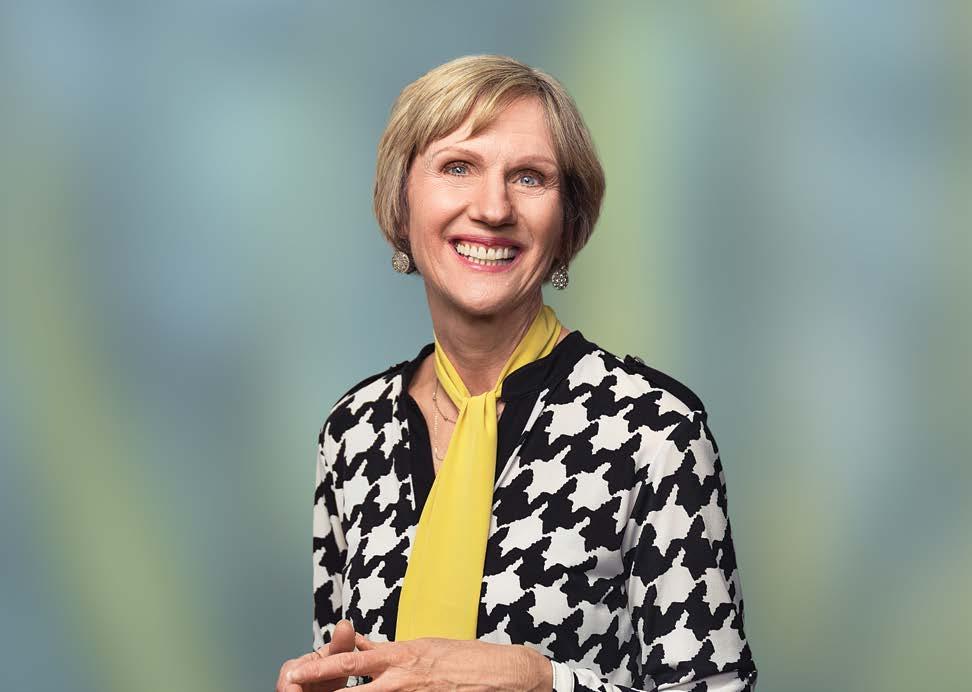
“If you zoom out and think about what makes a culture, it’s our stories. That’s always been true, at every level. Storytellers shape our world, and the law is one of the stories we continue to tell.”

As Debra Stephens (’87, ’93 J.D.) begins her second appointment as chief justice of Washington State’s Supreme Court, she likes to keep her family history in the front of her mind. It helps keep her grounded.
Her father’s family immigrated to the United States, and he grew up helping run a truck stop café and gas station. Her mother had a hardscrabble upbringing in Kentucky before moving west. The stories she grew up hearing – about people meeting challenges with grace, grit, and ingenuity –continue to inform her work as a judge.
“I come from a family of scrappy smallbusiness owners, people who knew how to make things work,” she says. That idea of making things work extended beyond Chief Justice Stephens’s household. She learned serving your community isn’t a separate part of life, it’s expected. Her father served in a variety of volunteer positions, including 35 years on a school board and her stepmother was a teacher. One way or another, she knew she wanted to make a difference, to serve. In high school, she was active in her church and in student government. She holds a quote from Margaret Mead close to her heart: “Never doubt that a small group of thoughtful, committed citizens can change the world. Indeed, it’s the only thing that ever has.”
Though you can see the inklings of her career in her upbringing, Justice Stephens’s path to the law wasn’t
straight or expected. She talks about her life being marked by chance encounters and serendipity, but in a way reminiscent of the saying, “The harder you work, the luckier you get.” Her first love was theater and music. Through this she found a passion for debate, earning a scholarship and studying philosophy at Gonzaga University while competing on the debate team. After undergrad, she briefly pursued a doctorate in philosophy before moving back to Spokane, where chance encounters nudged her toward law school. She received a Thomas More scholarship at Gonzaga, a program for law students interested in public service. At the time, Justice Stephens was married with a five-week old child. She learned how to balance the intense demands of school and early motherhood. While in law school, she also competed in moot court all three years, winning national Best Brief and Best Oralist awards, and she served as president of the Public Interest Law Project.
“If you want something done, ask a busy person,” Justice Stephens says of the time, laughing. Her savoir faire and good humor make her disarming, approachable, and trustworthy, and her ability to manage competing priorities has been an essential component of her success as a judge.
Justice Stephens relies on collaboration and deep, active listening. At the heart of her judicial philosophy lies a foundational empathy. She’s deeply attuned to issues of justice and opportunity, and contends with the lived realities of
the law with surprising compassion. Her commitment to making courts more accessible and inclusive stems not from abstract principle but from witnessing firsthand how systems can either uplift or alienate people.
“We all want the same thing,” she says. “We want to be seen and listened to and understood, even when we disagree. Maybe especially when we disagree.”
Above all, Justice Stephens cares about the human element of the law, because behind every case she hears is a story.
“Judges, especially at the appellate level, are the keepers of our legal culture,” she explains. “How we take those stories that go back over 200 years and keep them relevant to what’s happening now is the challenge. If you zoom out and think about what makes a culture, it’s our stories. That’s always been true, at every level. Storytellers shape our world, and the law is one of the stories we continue to tell.”
Justice Stephens feels a responsibility to get that story right.
“The values that we advance become our rules. We change them when we have the will to change them,” she says. “We see what we’re willing to see, and it’s important to listen to diverse perspectives to see what has often been overlooked but is hiding in plain sight.”
In her job as chief justice, she will do her best to keep her eyes trained on the deeper truths, and to listen to the voices of those around her in the course of making decisions.

“I always try to staff my cases with women and give them the opportunities on depositions and drafting briefs. I want to help them find their footing.”

Megan New (’09 J.D.) doesn’t shy away from a fight. As a partner at Barnes & Thornburg in Chicago, she specializes in intellectual property litigation and has all the tenacity and passion that a trial lawyer needs to get the best results for her clients.
“I’m a run-through-walls attorney,” she says. “My greatest strength is my work ethic. No one’s going to work harder than me.”
Whether battling over trademark infringement, patent disputes, or trade secrets, New brings a competitor’s intensity to the courtroom. Every case is an intellectual boxing match that takes months, even years, to prepare for.
“You’re planning and strategizing all the time,” she explains. “From the moment a case arrives, you’re preparing for the trial. And when you get to trial, you get the pleasure of seeing all your hard work come together. But there are always surprises. You have to be able to think on your feet.”
While New didn’t always want to be an attorney, she has always wanted to effect meaningful change. After graduating from Santa Clara University, she pursued a career in politics. For four years she worked for a handful of members of Congress on Capitol Hill, in Washington D.C. But this was in the early 2000s, when legislative gridlock was worse than the traffic on the Beltway, and she started to feel stuck. She wanted to see more immediate results from all her hard work and tremendous energy.
“By the time I had decided on law school, I knew that was what I wanted to do,” she reflects. Her purpose had crystallized. Now, when she speaks with younger people, she advises them to try to find the same sense of certainty. “Do not become a lawyer unless you know deep down it’s what you want to do. It’s very demanding, very difficult. If you don’t love it, it’s hard to maintain the quality of work you need to succeed.”
At Gonzaga, New found the challenge and community she was looking for. She remembers working with Professor Sheri Engelken, a role model who sparked New’s interest
in IP. She used in class as examples cases she’d litigated, including one about a trademark infringement dispute involving the grilles of Jeeps and Hummers, to teach her students about how they can use the rules of civil procedure to develop winning strategies for their clients. In a field typically dominated by men, Professor Engelken’s success was inspiring. Now, New does her best to pay it forward by mentoring.
“I always try to staff my cases with women and give them opportunities on depositions and drafting briefs,” she says. “I want to help them find their footing.”
Beyond her paid work, New has an active pro bono practice. She works with victims of domestic violence, independent artists looking to secure IP protections, and criminal appeals.
“I’m a very justice-oriented person,” she says. “I have strong convictions about what is right and what is wrong, and strong feelings about how we should treat each other. And I’ve always thought it was a lawyer’s job to use their training to help people.”
• Richard C. Adamson †
• Richard Agman †
• Michael Agostinelli
• Richard Algeo
• Antone Ancich, Jr.
• Grant Anderson
• James Anderson
• Roger Anderson †
• Lewis Arnold
• Lucy Arnold
• Philip Arnold
• Lowell Ashbach, Jr.
• Gary Baldwin
• Mark Bantz
• Frank Bartoletta
• Robert Beach III
• Charles Bean
• T. Casey Beecher †
• Craig Beles
• Alfred Bennett †
• Arthur J. Bieker
• Ronald Bliss
• Edward Block
• Drew Bodker
• John Boyce
• Douglas Brajcich
• The Hon. John Emmett Bridges
• Laurence Briney, Jr.
• Philip S. Brooke III
• Daniel Brown
• Daniel Brunner
• Garry Bunke †
• Francis A. Burke
• John F. Bury
• William Cameron
• Joe Carter, Jr.
• Mark Casey
• Dennis Chun
• Walter Michael Clark †
• Walter Clayton III
• Roger C. Clement, Jr. †
• Thomas Cochran
• Robert H. Coon †
• Daniel Charles Corby †
• Lindsey Cotterell
• James Craven
• John R. Crickman
• Charles Cruikshank III
• Steven Crumb
• James Carl Dahl †
• Paul Dalton
• Ed Danz, Jr.
• Douglas Davis
• Charles J. De Bruler
• James Dennis
• The Hon. John H. Doherty
• The Hon. Jerry M. Dolan †
• Dave Dressel
• David Eash
• James E. Egan
• Douglas W. Elston
• John M. Ennis
• Hugh Evans †
• Howard Fischer
• Michael Freed
• John P. Giesa
• John Gleesing
• The Hon. Steven Grovdahl
• Jokanan Guillen-Nunez
• Michael Hagan
• George Hamano †
• John Hamlin
• Patrick J. Hand
• Mark Hanley
• Craig Hanson
• Vernon W. Harkins
• Lt. Col. Randy L. Harshman
• Steven J. Hassing
• Patrick Hayes
• Tony Hazapis †
• Gary Hemingway
• David Herman
• Charles Herrmann
• John Hicks
• Brian G. Hipperson
• David Hoffman
• Gerald Horne
• Ernest F. Huber
• Robert H. Huneke †
• Willard Huss
• Bruce Ireland
• David Israel
• Helen M. Jacobson
• David Jamieson, Jr.
• Donald Jansen †
• Henry Jasen
• Larry A. Jelsing
• Richard Jessup
• Peter J. Johnson
• Richard R. Johnson †
• Thomas Johnson
• T. Steve Joyce
• Robert Kalof
• Chester Kanai
• George Karavitis
• Ed Kauzlarich
• David D. Kilpatrick
• Timothy Knowling
• Donald Koler
• Walt Krueger
• Katherine Kuriyama
• Leroy Kuwasaki, Jr.
• H. Terry Lackie †
• Larry Larson
• Paul Larson
• Michael F. Lavery
• Ian Ledlin
• Jonathan Lee
• Craig Leri
• Douglas C. Lewis
• Tom Lewis
• Jeffrey A. Link
• Brian Linn †
• Stephen Llewellyn
• Scott Lowry
• Tim J. Mackin
• Timothy Mahoney
• Larry Mailloux
• Tony Martin
• William Maxey
• Charles D. McClung
• Melissa F. Borr McCue
• James McDevitt
• Joseph McGough
• Mike McGrath
• Jock McIntosh
• James S. McLean
• Noel McMurtray
• The Hon. James Michaud
• Brian Miller †
• Michael Miller
• Stephen Miller
• Charlton Mills
• Commissioner Royce Moe
• Fred Montoya †
• Richard Montoya
• Gene Moses
• Patrick J. Mullen
• John Murphy †
• Christopher Nelson
• Mark T. Nesbitt †
• Gretchen Newman
• The Hon. John F. Nichols
• Chris Nickola
• John C. O’Brien, Jr.
• The Hon. Kathleen M. O’Connor
• Gayle M. Ogden
• Zenon Olbertz
• Richard Olsen †
• James Palmer
• Brian M. C. Pang
• Vicki Lee Anne Parker
• Ronald Perkins
• Richard Alan Petersen
• Daniel Peterson †
• Roger Peven
• Charles Pfeifer
• James Pidduck, Jr.
• Steven J. Pierce
• Gerald Pike
• Curtis Pintler
• Greg Pittenger
• Gregory Potegal
• Candy K. Powers
• Steven Pruzan
• The Hon. Henry A. Rawson
• John Raymond
• James Reed
• William F. Reeves
• Kathleen Ross Reno †
• Clark Richards
• The Hon. Neal Q. Rielly
• Frank H. Roberts
• Richard Lee Rolph †
• Howard C. Rosenblatt
• David Ross
• William Rossi †
• Catherine Roth
• Phil Roth
• Norman Sauer †
• Mr. Jerry Dean Saxton
• Walter Schefter, Jr.
• Joseph R. Schneider
• David Schoengold †
• Duane E. Schofield †
• Allen Schwenker II †
• Douglas W. Scott
• Richard L. Sessions
• D. Jean Shaw
• Christopher Shea
• The Hon. James Sherry
• Noel Shillito
• Tom Silverman
• Raymond T. Simpson, Jr. †
• Scott Simpson
• C. Joseph Sinnitt
• Tom Sirrs
• Roland Skala †
• Commissioner Frank Slak, Jr.
• The Hon. Berkeley Smith
• Marvin Manuel Smith †
• Shepard Smith
• Jerry Sorlien
• Larry Stephenson †
• Harvey Sullivan †
• Steven Summit
• Dr. Philip D. Supina
• Robert Arthur Sutton
• Brad Lee Swaner †
• Michael Sweeney †
• Reana K. Sweeney
• Mr. William James Symonds
• Gary Taylor
• Mr. John Arthur Shapland Tibbs
• Dan Tighe †
• The Hon. Patrick E. Tondreau
• Steve Topol
• Stephen W. Trefts
• Michael Tronquet
• Dennis Vanairsdale
• John VanderMolen
• J. Timothy Viall
• Jay Violette †
• Marc Wallace
• Carl N. Warring †
• Kenneth Watts
• Randall J. Watts
• Gerald Wear
• James Whitaker †
• Larry Wilde
• Virginia (Somers) Worthington †
• Virginia Ehrig Worthington †
• Linda M. Youngs
• Jim Zachor, Jr.
• Stephen P. Zagelow †
• Michael Zimmar † Honors those who have passed away.


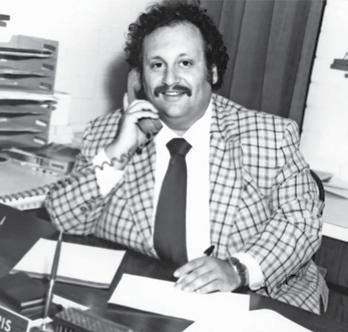

Anthony (Tony) Hazapis was hired by Gonzaga University in 1975 as an assistant to the Dean of the School of Law for placement.
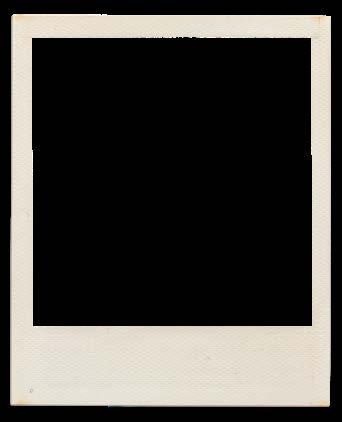
Eva Stradley was the registrar for the Law School from 1951–1975.
John E. Clute served as professor of law, dean of the Law School as well as chairman of the Board of Trustees at Gonzaga University. He also served as senior vice president of human resources and general counsel for the Boise Cascade Corporation.
After retiring from the U.S. Attorney’s Office for the Northern District of Texas in 2007, Bob Webster established a federal white collar criminal defense practice in Dallas. He was recently recognized by the Dallas Bar Association as the 2024 Trial of Attorney of the Year.
Chris Drake retired from the same U.S. Attorney’s Office as Webster and returned to the Potter County Attorney’s office in Texas after a 25-year absence from where she also retired and subsequently joined Webster in their criminal trial practice. Drake claims her association was the real reason for Webster’s recognition.
Fred Rivera started a sports and entertainment advisory firm called The Rivera Group while continuing to focus on his board director work after serving for eight years as the executive vice president and general counsel with the Seattle Mariners. Rivera continues to support the Seattle Mariners in a special adviser role on a consulting basis, assisting the Club’s efforts with ROOT SPORTS and other business initiatives.
Richard A. Davey Jr. was honored as the featured speaker at The Moles 2025 Outstanding Achievement Awards in New York City on January 8, 2025. This is a renowned event that has celebrated excellence in the heavy construction industry since 1941. His message emphasized the importance of doing big things, particularly in investing in infrastructure. He also congratulated Paul Schmall and Anthony Binsfeld for being recognized for their contributions.
After unanimously passing the Senate Director’s Nomination Committee on April 3, 2025, Gaetano Testini was confirmed without opposition by the full Arizona Senate to serve as director of the Industrial Commission of Arizona on April 10, 2025.
Kutak Rock Attorney Geana Van Dessel took on the important role of judging two moot court competitions made up of students at Gonzaga University School of Law – National Appellate Advocacy and Saul Lefkowitz. These proceedings empowered law students to deepen their understanding of the legal system and oral advocacy in a competitive environment focused on appellate issues and matters arising in U.S. trademark and unfair competition law.
Charles (Chuck) T. Conrad became president of the Utah Association of Justice and will serve from October 2024 to October 2025. Conrad is an attorney/partner at Fabian Vancott.
Richard Hy started a new position as partner at Claggett & Sykes Trial Lawyers.
Kaitlin Roach became a partner at GLP Attorneys, P.S., Inc. She is the Learning & Development Director in its Seattle office and leads the firm’s statewide legal internship program.
Abra Belke was promoted to shareholder at Strong & Hanni Law Firm, PC.
Sarah Elsden, a Spokane litigation partner at Kutak Rock LLP, received the Vanessa Behan Helping Hands Award. This award recognizes a donation of pro bono hours, fundraising, and support of the Vanessa Behan Children’s center. Elsden also took on the important role of judging two moot court competitions made up of students at Gonzaga University School of Law – National Appellate Advocacy and Saul Lefkowitz.
Deanna Willman started a new position as corporate counsel at Teck Resources Limited.
Pam Kohlmeier joined Witherspoon Brajcich McPhee, PLLC, to use her dual license as a physician and attorney in the state of Washington and to utilize her expertise on the Health Care practice team.
Kutak Rock Attorney Lesley Gangelhoff took on the important role of judging two moot court competitions made up of students at Gonzaga University School of Law –National Appellate Advocacy and Saul Lefkowitz.
Jessica Anleu was recognized as one of the Top Pro Bono Attorneys for her dedication to helping those in need. Her firm, Zava Immigration Law, places giving back to the community at the heart of its mission.
Brielle Rumsey joined the board of directors of the Colorado Women’s Chamber of Commerce, a leading nonprofit organization dedicated to advancing women’s leadership in the state. She began serving a three-year term while working as an associate in Brownstein Hyatt Farber Schreck’s real estate department.
Marthy Hernandez started at a new position as associate attorney at Kilpatrick Townsend & Stockton LLP working on the Native American Affairs team.
Jessica Batey joined Riverside NW Law Group, PLLC, in the summer following the completion of her clerkship. While her time at the Court of Appeals was invaluable, she looks forward to representing clients and advocating for others.
The U.S. Attorney’s Office, Eastern District of Washington, announced Annika Tangvald as special assistant U.S. attorney to prosecute drug trafficking.
Jeremiah (JJ) Bourgeois was recognized by Haymarket Books and the Mellon Foundation as one of the 2025 Writing Freedom Fellows. The fellowship supports and elevates writers who are impacted by the carceral system. Bourgeois is a nonfiction and legal writer whose work focuses on sentencing and corrections. Bourgeois is the author of “The Extraordinary Ordinary Prisoner: Essays from Inside America’s Carceral State,” and his scholarship has appeared in the “American Journal of Criminal Law” and the “Seattle Journal for Social Justice.”
Jackson Woods joined Piskel Yahne Kovarik, PLLC. Woods practices in the area of civil litigation, including contract disputes and personal injury cases. A former resident of rural Oregon, he is an avid outdoorsman and previously worked in fisheries and wildlife science.

Lifetime Contributors
$1,000,000 and Above
- Louis † and Kathryn Barbieri †, ’40
- Chester and Catherine Chastek †, ’40
- Fred † and Barbara Curley †
- J. Donald, ’60 and Va Lena Scarpelli Curran, ’58
- John Hemmingson
- Paul ’59 and Lita (Barnett) Luvera, ’77
- Smithmoore Myers † and Sandy SanduloMyers †, ’39
$500,000 - $999,999
- Joshua and Janae Conaway, ’03
- Gonzaga University Law Adjunct Faculty
- John and Deborah Holleran, ’79
- Joseph A. Lincoln, Jr.
- Norm † and Rita Roberts, ’59
- Katharine Witter Brindley and Ralph Brindley, ’84
$250,000 - $499,999
- John † and Nancy Clute, ’63
- Kevin Curran and Jean-Carlo Rivera, ’88
- Joseph and Helen Delay †, ’52
- Dr. Nicholas and Katherine Lovrich
- Renee R. Reuther, ’90
- Jim † and Beverly Rogers
- Sunbelt Communications Company
$100,000 - $249,999
- Matt and Eleanor Andersen, ’76
- Charles Brink, ’78
- Loren † and Janell Burke, ’83
- Holly Louise Caudill †, ’93
- Ben B. Cheney Foundation
- Kelly and Sharon Cline, ’85
- DAFgiving360
- Harry and Dorothy Dano †, ’41
- William Eddleman †, ’39
- Goldman Sachs Philanthropy Fund
- Jerry † and Helen Greenan, ’57
- Mark and Mary Griffin, ’86
- Daniel P. Harbaugh, ’74
- Jerome and Vicki Jager, ’57
- Jewish Community Foundation of Greater Phoenix, Inc.
- George † and Shari Kain, ’58
- Bob and Ginny Kane, ’77
- William V. Kelley †
- Joseph and Muriel Murphy †, ’42
- Karl and Michelle Quackenbush
- The Honorable and Mrs. Philip M. Raekes †, ’59
- Yale Metzger † and Susan Richmond, ’95
- Bill Roach †
- Patrick † and Diane Sullivan, ’59
- James and Dee Sweetser, ’84
- Sweetser Law Office
- Washington Trust Bank
- Carrie Welch Trust Estate
With sincere thanks to our donors, the Gonzaga Law School Foundation proudly recognizes those whose support through May 31, 2025 ensures the school’s continued success.
$50,000 - $99,999
- The Brink Foundation
- Janice Brown, ’84
- John R. Clark † ’80 and The Honorable Ellen K. Clark, ’82
- Harriet Clarke †
- Marvel Collins Estate
- Jack and Angela Connelly
- Reanette Cook Estate
- Dan † and Susan Corkery, ’75
- Michael and Rebecca Costello, ’96
- James and Carolyn Crowe †, ’93
- Vern Davidson †
- Delay, Curran, Thompson & Pontarolo, PS
- Ralph Dixon, ’77
- Mark Donahue
- John and Allison Durkin, ’80
- James and Frances Flanagan †, ’40
- Bart, Hilke and Bridget Gallant, The Horrigan Foundation
- Harold and Mary Anne Hartinger †, ’54
- Stephen † and Martha Haskell, ’77
- Greg and Susan Huckabee, ’76
- Intermountain Leasing
- Helen John Foundation
- Frank and Maureen Johnson †, ’51
- George and Nancy Lobisser, ’78
- Lukins & Annis P. S.
- Timothy J. Lynes ’84 and Joan C. Morningstar, ’83
- Justice Barbara and Donald † Madsen, ’77
- John E. Manders Foundation
- Dick Manning and Jen Gouge, ’60
- Randall and Janet McNeice
- Ryan † and Sarah McNeice, ’05
- Richard McWilliams Estate, ’58
- John † and Guelda Messina, ’69
- Wes and Mary Lee (Toepel) Nuxoll †, ’54
- Pricewaterhouse Coopers LLP
- John R. Quinlan †, ’60
- Estate of Philip M. and Mary M. Raekes
- Irene Ringwood, ’84
- Elizabeth D. Rudolf
- John Curtis Rudolf
- Dick ’79 and Karen Sayre, ’85
- John and Penny Schultz, ’63
- Chuck † and Rojean Siljeg, ’60
- Skip Smyser, ’77
- Philip and Margretta Stanton †, ’56
- Joseph and Parker Sullivan, ’85
- The Honorable and Mrs. Dennis Sweeney, ’72
- David and Angelica Torres, ’86
- The Honorable Bob † and Diane Waitt, ’57
- Washington State Bar Association
- Washington Trust Bank Financial Corporation
- Jim and Joyce Workland †, ’64
$25,000 - $49,999
- AccessLex Institute
- American Academy of Matrimonial Lawyers
- American College of Trial Lawyers
- Gene † and Carol Annis, ’59
- Association of Corporate Counsel Washington State Chapter
- Bank of America Foundation
- David and Nancy Bayley, ’76
- Mark Beggs and Florfina Cacanindin, ’80
- The Blackbaud Giving Fund
- David and Ellen Bolin, Jr., ’85
- John † and Kaye Condon, ’77
- John † and Mary Jo Costello
- Patrick and Paula Costello
- Paul and Joan Delay, ’86
- Gary J. and Claire Dmoch, ’76
- Gary J. Dmoch & Associates
- Philip and Mary Dolan †
- Mr. Phillip E. Egger, ’81
- Bill Etter, ’78
- Richard C. Eymann, ’76
- Chief Justice Mary E. Fairhurst †, ’84
- Fidelity Investments Charitable Gift Fund
- Rick Flamm ’79 and Vesna Somers, ’81
- Michael A. Frost, ’73
- Joe and Joan Gagliardi †, ’59
- Jim † and Margel Gallagher
- Paul and Nancy Greeley, ’82
- Stevan Hann
- Jeffrey and Diana Hartnett, ’76
- Karen and Michael † Harwood, ’88
- Howard † and Darlene Herman, ’62
- Lloyd and Linda Herman, ’66
- Dennis Hottell and Terese Colling, ’76
- Innovia Foundation
- Robert Lawrence Ives and E. Marie Pintler
- Steven Jager, ’80
- Jager Law Office PLLC
- Richard † and Janet Johnson, ’75
- Dan and Margaret † Keefe, ’74
- Chris and Nanette Kennelly, ’97
- King County Bar Foundation
- Thomas † ’76 and Cheryl (DeMers) Kingen, ’76
- Lee & Hayes, PC
- Ellen (Kremer) Lenhart, ’87
- Bill and Suzanne Lindberg, ’73
- The Honorable John J. Madden, ’68
- Helen McDonald †
- Alejandra Mireles, ’04
- The Honorable and Mrs. James M. Murphy, ’73
- Joe Nappi, Jr. and Mary Nappi, ’72
- Jack Nevin, ’78
- Verne and Mary Oliver †
- Dean Lewis H. and Mrs. Jackie Orland †
- Patton Boggs Foundation
- Donald † and Christie Querna
- Gary and Sharon Randall
- Diehl † and Anne Rettig, ’69
- Mrs. Mary Jane Rovai, ’59
- Kerm and Fran Rudolf †, ’51
- Rudolf Family Foundation
- The Honorable † and Mrs. Barry E. Ryan, ’76
- James and Marilyn Sachtjen
- Kenneth A. Scaz, ’98
- The Honorable and Mrs. † Richard J. Schroeder, ’63
- Mrs. Tod Sharpe †, ’51
- Roger † and Angelika Smith, ’58
- Jim and Margaret Solan †, ’49
- Lee M. Solomon Estate
- The Honorable Gregory Sypolt, ’76
- David and Kay Syre, ’72
- Paul and Gail Taylor, ’84
- Phebe Thompson
- Robert Thompson, Jr., ’73
- The U.S. Charitable Gift Trust
- Union Pacific Foundation
- United Way of Benton & Franklin Counties
- United Way of King County
- Donald Verfurth, ’85
- J. Prentice Warner Estate
- Clifford and Karen Webster, ’77
- Dennis † and Jackie Wheeler
- The Honorable Donna L. (Kamps) Wilson, ’80
$10,000 - $24,999
- Keller and Kathy Allen, ’89
- American Endowment Foundation
- Phillip Armstrong, ’78
- Jim and Linda Baker, ’79
- BarBri Bar Review
- The Honorable and Mrs. Paul Bastine, ’64
- Jim and Lynelle (Wahl) Beaulaurier, ’77
- Cristine (Long) Beckwith, ’04
- Benevity
- Maureen (Greenan) Bergquist
- James Berlin †
- Mr. David Berry and Dr. Kim Hamlett, ’91
- Jefferson W. Boswell, ’09
- Allen Brecke, ’77
- Roger G. Brown, ’80
- The Honorable Franklin D. † and Mrs. Treava Burgess, ’66
- Paul Burglin and Ramona Sanderson-Burglin, ’84
- Bruce and Judy (Acher) Butler, ’80
- William and Judy Carlin, ’76
- Carney Badley Spellman
- CEMEX Materials LLC
- Thomas † and Joan Chapman, ’62
- Catherine C. Clark, ’91
- Paul Clausen Estate, ’40
- Mr. Charles A. Cleveland, ’78 and The Honorable Joyce J. McCown, ’80
- John and Mary Close †, ’38
- Thomas and Barbara Cochran, ’75
- Francis † and Audrey Conklin
- James † and Marianne Connelly, ’53
- John and Barbara Cooper
- The Honorable Kenneth L. Cowsert, ’73
- James and Carolyn Craven, ’75
- George and Diane Critchlow, ’77
- Mike and Alison Delay, ’88
- Fred O. Dennis Estate
- John and Kristine Dippold, ’95
- Jeff Donahue and Theresa Rambosek, ’87
- Norb and Ruby Donahue †, ’41
- Kevin and Jackie Driscoll
- Leo and Mary Driscoll †, ’51
- Paul † and Carol Eng, ’87
- Robert Evans and Lisa Fitzpatrick, ’78
- James Fausone, ’81
- Roger Felice, ’73 and Summer Rife, ’20
- Joe Fennessy, Jr. †, ’40
- James † and Mikell Fish, ’62
- Dan and Karen Flynn, ’83
- Professor and Mrs. Michael F. Flynn, ’77
- Francois and Debra Forgette, ’77
- Merrit and Yolanda Foubert †, ’51
- Andrew and Susan (Maloney) Friedman, ’93
- Gary Gayton, ’62
- Janice (Bennett) Geier, ’89
- Jim Giudici, ’79
- Phelps † and Mary Jean Gose, ’62
- Constance D. Gould, ’79
- William and Margaret Grant †, ’54
- Bill † and Norma Grismer, ’53
- Frederick † and Marie Halverson, ’61
- Hands Off Cain - European Parliament
- Randy ’78 and Bridget (McInerney) Harris, ’79
- Frank P. Hayes †, ’43
- Mary and Tom Herche
- Prof. Gerald Hess and Dr. Layne Stromwall
- Daniel and Jill Hulsizer, ’02
- E. J. Hunt, ’80
- IBM Corporation
- Mark Iverson and Michaele Dietzel, ’88
- Thomas and Sandra Jarrard, ’07
- Mary Lou Johnson and Dr. Daniel Schaffer, ’92
- Johnson & Johnson Law Firm, PLLC
- Joseph (Ortiz) Kaaiakamanu, ’08
- Robert Keefe, ’73
- Marcus † and Dorothy Kelly, ’57
- Daniel Keppler ’92 and Meagan Flynn, ’92
- Mike and Terri Killeen, ’77
- James and Mary Anne (Metcalfe) King, ’78
- The Honorable Frank L. Kurtz and Ms. Nanette Romney, ’74
- Alan Lamia, ’70
- Paul and Kristina Larson, ’75
- Lasher Holzapfel Sperry & Ebberson
- Alex and Karen Laughlin, ’85
- Richard and Roberta (Scott) League, ’91
- Legal Foundation of Washington
- Tom Lewis
- Thomas J. Lucas, ’76
- Earl and Laura Martin
- The Honorable Craig Matheson, ’76
- Prof. John Maurice
- Lenora McBirney †
- George † and Colleen McCabe, ’57
- Mr. Leo A. McGavick †, ’29
- The Honorable † and Mrs. J. Ben McInturff, ’52
- Robert and Christina McKanna †, ’54
- Scott ’90 and Nicole (Annis) McKay, ’92
- Johnston Mitchell ’92 and Christine CoersMitchell, ’92
- John Monahan, ’74
- Donald and Mary Moore †, ’53
- Daniel and Mary Beth Morrissey
- Brian ’86 and Madeleine (Wanslee) Mullen, ’88
- Ann Murphy
- Michael Myers and Carole Rolando, ’83
- Jerry Neal †, ’69
- Northern Trust Bank
- Northwest Fund for the Environment
- Donald and Christine O’Neill, ’78
- The Honorable Stephen and Karen Osborne, ’73
- Charles and Helen Palmerton †, ’52
- PEMCO Mutual Insurance Company
- Tony and Patty Philippsen, ’73
- Harry and Alethea Platis, ’69
- Estate of Louis Powell
- Preston Gates Ellis & Rouvelas Meeds, LLP
- The Honorable † and Mrs. Justin Quackenbush, ’57
- Joseph F. Quill and Dolores M. Quill Trust
- Tim Quirk and Sally Bulger Quirk, ’73
- Les and Clara Randall †
- Timothy and Julie Reid, ’83
- Prof. Speedy Rice and Judy Clarke
- John † and Joy Richards, ’87
- Sheila C. Ridgway, ’84
- Ridgway Law Group, P.S.
- The Honorable Jack J. and Patricia Ripple †, ’50
- Ronald and JoAnn (Salina) † Roberts, ’64
- The Honorable Michael P. Roewe †, ’74
- Jacob and Kelly (Drew) Rooksby, ’07
- Sayre & Sayre P.S.
- Nicholas Scarpelli, ’74
- Albert and Betty Schauble †, ’58
- Gerald and Rita Schears
- John † and Catherine Schultheis, ’61
- Dennis and Marie Sheehan, ’76
- Shell Oil Company Foundation
- Stokes Lawrence, P.S.
- Daniel Stoner and Anne Santee-Stoner
- The Stoner Foundation
- Irene Strachen Charitable Trust
- Stritmatter, Kessler, Whelan, Withey, Coluccio
- Robert Sullivan, ’86
- Gaetano and Melissa Testini, ’00
- The Honorable † and Mrs. Joseph A. Thibodeau, ’66
- James and Carmelita † Thomas
- Prof. Mary Pat Treuthart and Dan Webster, Jr.
- James † and Marian Triesch, ’41
- Patrick and Kristina Trudell, ’80
- Joseph and Janna Uberuaga, ’77
- United Way of Spokane County
- The Unova Foundation
- Prof. James M. Vache
- Vanguard Charitable Endowment Program
- Verizon Foundation
- Shannon M. Votava, ’85
- Marc and Nancy Wallace, ’75
- James and Kathleen Walsh, ’81
- Patrick ’10 and Jaunessa (Wendel) Walsh,
- Washington Judges Foundation
- Martin and Jane Weber, ’64
- Stan and Gina Welsh
- Western Atlas Foundation
- The Honorable † and Mrs. John F. Wilson, ’56
- Mark E. Wilson †
- Winston & Cashatt
- James and Jackie Wolff, ’74
- Women’s Law Caucus
- Michael and Anita Zdancewicz, ’88
- Kevin J. Zilka, PC
- Stephen and Debra Zwight
† Honors those who have passed away.
Great care was taken to ensure the accuracy of this listing. Should there be any discrepancies, please email Sarah Guzmán, guzmans@gonzaga.edu.
The Gonzaga University School of Law community extends its deepest condolences to the families of our beloved alumni and friends. †
Richard F. Ayres 1960
Robert Baumann Jr., Esq. 1968
Kenneth Bjorge †
Ruth (Bauer) Bohms 1985
James Borchers 1977
Jim M. Bresnahan †
Tom Burkemper †
Michael D. Corry 2003
Rosa Marie R. Cortez 1988
John Costello †
D.C. Cronin 1985
James Crowe 1993
Jean Dacres †
Sara (Darcy) Seaborg 1995
Lucile S. Dibblee 1953
Tracy DiFillippo 2001
The Hon. Gordon L. Godfrey 1976
Robert Graham 1956
Floyd Ivey 1976
Frank Hayes Johnson 1951
Terry Kissane 1967
Felix Landau 1983
Richard Langabeer 1970
Carolyn Kay Leclaire 1990
Peter Lineberger 1976

David M. McIntosh 2005
Yale Metzger 1995
Kirk Miller 2008
Donna Marie Mitchell 1985
Claude Montecucco 1989
Richard Montecucco 1958
Frances Munson †
Christopher L. Neal 2002
Jerry Neal 1969
George R. Nethercutt, Jr. 1971
Fred Palmer 1973
The Hon. John M. Paternoster 1977
James A. Pelkey 1978
The Hon. Justin Quackenbush 1957
Grant Reynolds 2018
David Roberge 1979
Mark Rotchford, Sr. 1958
Matthew Rutt 1986
The Hon. Barry E. Ryan 1978
Kurt Salmon 1977
Duane E. Schofield 1975
Frederick Smith 1965
Mark Staples 1980
Mr. Hank Widenmann 1973
The Hon. Darvin J. Zimmerman 1976
Frank H. Johnson was a proud graduate of Gonzaga University School of Law and a standout member of the Gonzaga basketball team during the 1945-46 season. Known for his “unorthodox free-throw shooting motion,” Johnson brought passion and perseverance to the court — qualities that would define his life and career. After one season of basketball, he focused on his legal education, embodying the same discipline in the classroom he had shown as an athlete.
Following law school and service in the Korean War, Johnson began his legal career in the Spokane County Prosecutor’s Office. He later rose to the role of chief criminal deputy, playing a key role in several prominent cases throughout the region. Among them was the tragic 1959 murder of Candice “Candy” Rogers — a case that
George R. Nethercutt, Jr. built a distinguished career in public service, law, and civic engagement, with a lifelong commitment to principled leadership and bipartisan cooperation.
Nethercutt practiced law and was active in public affairs. He founded The George Nethercutt Foundation, which promotes civic education among young Americans through scholarships, leadership training, and policy discussions.
Nethercutt rose to national prominence in 1994 when he was elected to the U.S. House of Representatives, where he served Washington’s 5th Congressional District for five terms. During his time in Congress, he was recognized for his work on the House Appropriations Committee and his advocacy on issues ranging from agriculture to health care and national security. He was instrumental in bringing attention and resources to Eastern Washington and was known for his emphasis on accountability, fiscal responsibility, and strong constituent service.
remained unsolved for decades before being closed in 2024 through advanced DNA analysis, a testament to the foundational work done by early investigators like Johnson.
Johnson was known for his tireless work ethic, a deep integrity, and an unwavering commitment to justice. A respected figure in the legal community, he was admired not only for his legal skills but for his mentorship and public service.
Throughout his life, Johnson remained a loyal supporter of Gonzaga, proudly cheering on the Bulldogs and reflecting fondly on his time as both an athlete and law student. His legacy lives on through the many lives he touched — as an attorney, mentor, and devoted Zag through and through.
Tracy DiFillippo was a respected Las Vegas attorney known for her legal acumen, community service, and dedication to pro bono advocacy. A partner at Armstrong Teasdale LLP, she focused her practice on complex commercial litigation, including construction law, malpractice defense, and corporate disputes.
As a student, DiFillippo participated in Law Across Borders. Post-graduation, DiFillippo began her career clerking for the Nevada Supreme Court before rising to prominence in Nevada’s legal community. Beyond the courtroom, she was a passionate advocate for access to justice, receiving the Vince A. Consul Memorial Pro Bono Award for her mentorship and service. She served on the board of Explore Knowledge Academy and was actively involved in supporting education and women’s leadership. She lived her life as a mentor, leader, and champion for justice.

By Dallan Flake, Associate Dean, Faculty Scholarship; Associate Professor of Law
“What do you wish Americans realized about the immigrants who pass through your shelter on their way to the United States?” After a few moments of silence the director of Casa del Migrante, a migrant shelter in Guatemala City, looked up and quietly yet resolutely responded, “That you are all immigrants, too.” As I glanced around the conference room at each of my students, I could practically see their perspectives expanding before my very eyes.
This was a common occurrence during our two-week visit to Guatemala and Belize as part of the Law School’s new course, Law and Justice in Latin America. Throughout the trip, students interacted with lawmakers, attorneys, community leaders, and ordinary citizens who, although different in many ways, shared their same passion for justice.
On the side of a volcano near Antigua, students harvested coffee beans alongside a third-generation farmer as he explained how he and other growers in his community
have formed a cooperative that allows them to compete with larger, foreign-owned coffee producers. On the shores of Lake Atitlán, students listened intently as leaders from the Cojolya Association of Maya Women Weavers described the horrors their Indigenous communities suffered during the Guatemalan genocide, and how the women – many of whom were left widows – have pooled their resources to be able to produce and sell handwoven accessories at prices that allow them to feed their families. At the National Assembly in Belmopan, Belize, students learned from a legislative aide about the challenges of building a democracy in a country not yet 45 years old.
Thanks to a generous donation from a Gonzaga Law School alumnus, Dan Harbaugh (’70, ’74 J.D.), students participated in a service project replacing leaky thatched roofs with corrugated sheet metal for two families whose dirt floors often turned to mud during tropical rainstorms. Although the day was long and the heat relentless, students learned a powerful lesson about their capacity to impact others for good.
These and many other experiences broadened students’ understanding of global systems, enhanced their knowledge of cultural worldview frameworks, challenged their own culture and values, and allowed them to apply their knowledge of the law to contemporary global contexts. As a class, we reflected on what law and justice mean in countries where legal institutions are either unable or unwilling to provide relief. Day after day, we met with individuals committed to creating justice – for themselves, their families, and their communities. Their resolve and
ingenuity in the face of tremendous structural, economic, and political challenges was inspiring, helping us to realize that in spite of the justice system’s shortcomings, all is not lost. There are ways to make meaningful differences despite the limitations of the law.
While several students remarked that their experience in Central America was lifechanging, students at Gonzaga Law need not travel across the continent to have their perspectives broadened. Indeed, as the various articles and features in this magazine illustrate, the Law School strives to enhance its students’ understanding at every turn. I am profoundly grateful to teach at an institution that not only talks the talk but walks the walk. We are who we say we are, and our commitment to “educating the whole person to serve the public good, to engaging in dialogue with all cultures and religious or ethical traditions, and to pursuing justice” is real.
I hope my students returned from our trip forever changed, just as I hope all students who study at Gonzaga Law leave different than they entered – with greater knowledge, humility, enlightenment, compassion, and confidence to “go forth and set the world on fire.” Whether students choose to assist nonbinary and transgender community members through the Name and Gender Change ID Clinic, attend a Food for Thought lunch to learn about their professors’ latest research, or trek through a Guatemalan cloud forest to witness the effects of climate change – the numerous and diverse pathways Gonzaga Law offers its students all lead to the same destination: a place of understanding – of the law, of their capacity to serve the public good, and, perhaps most importantly, of each other.

